




















Political discourse in our country and in our state has deteriorated. Confidence in our government is at an all-time low. Polarization often prevents legislative compromise. Legislation often results from the actions of the party in power; rarely is it bipartisan.
Many media outlets capitalize on the polariza tion, focusing less on the day’s news and more on the resulting conflicts. The media recogniz es that conflicts draw the attention of readers and viewers. Rarely, do we see “good news” reported. Just problems and conflict. Conflict and problems.
Our courts are not immune to this polariza tion. The reporting that surrounds significant court decisions is often prefaced by identifying the political affiliation of the judges and, in the case of federal judges, the political party of the president who appointed the judges. Citizens from the same political party view themselves as constituents of judges from their party. They naturally conclude that judg es’ party affiliations are one explanation for their decisions.
Judges are unable to advocate for themselves. The most they can do is to write complete and thorough opinions each time they issue a decision. Unlike members of the legislative and executive branches, judges are ethically prohibited from walking up to a media outlet’s microphone to answer questions about their actions.

In such a landscape, where judges are elected like other members of government and where their decisions are often viewed as political, how can we best advocate for an independent judiciary and teach Pennsylvania citizens about the importance of judicial independence?
Let’s start with high school students. Let’s be sure they understand how our three branches
of government work and why there are checks and balances. Let’s teach them how our courts operate and why. Let’s provide resourc es that explain the process of seeking justice in our judicial system. Let’s take PBA-member lawyers/judges into high school classrooms across the state, show the students an inspir ing documentary film about a federal lawsuit and then explain how that lawsuit wound its way from the district court to the court of appeals to the U.S. Supreme Court and back down to the district court.
How do we do that? Teen Screen.
Teen Screen is a unique program offered to Pennsylvania high schools by Film Pittsburgh, a nonprofit that seeks to advance the art of independent film and uses film as an edu cational tool. Film Pittsburgh’s Teen Screen program curates independent films from around the world that deal with issues of interest to today’s youth. Many of those issues are part of the regular high school curriculum. Teen Screen works with teachers to select a film from its extensive film library, provides teaching resources to complement the film, arranges to screen the film either in the class room or at a movie theater and provides out side experts to discuss the themes presented by the film.
Recently, Teen Screen obtained the rights to screen a documentary about a federal lawsuit. Youth v. Gov is a documentary film that chron icles the case of Juliana v. United States, a lawsuit commenced in the U.S. District Court for the District of Oregon by a group of youth who claim that the actions of our federal gov ernment have contributed to climate change, depriving the plaintiffs of their constitutional right to a clean environment. The claims are novel and the procedural posturing of the case as depicted in the film provide PBA lawyers/
“
”
Let’s start with high school students. Let’s be sure they understand how our three branches of government work and why there are checks and balances.Jay N. Silberblatt


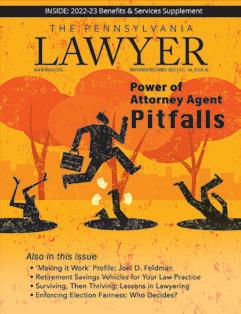





Appointed to committees of the Supreme Court of Pennsylvania: Judge Joffie C. Pittman III, Philadelphia, and Judge Karen E. Zucker, Montgomery County, Minor Court Rules Committee; and Judge Wendy G. Rothstein, Montgomery County, and Luke T. Weber, Lancaster County, Committee on Rules of Evidence.
Jillian F. Zacks of the Pittsburgh office of McAndrews Mehalick Connolly Hulse and Ryan PC, named board vice chair of Achieva, a nonprofit that advocates for, em powers and supports people with disabili ties and their families.
PBA President-elect Michael J. McDonald, McDonald & MacGregor LLC, Scranton, re cipient of a Lackawanna Pro Bono Attorney Robert W. Munley Distinguished Service Award.


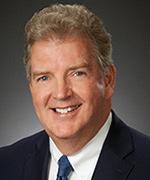
Amy L. Rosenberger of Philadelphiabased Willig, Williams & Davidson, named Alumna of the Year by Eastern Mennonite University.
John M. Quain Jr. of the Lancaster office of Barley Snyder, named the 2022 Pennsylvania Immigration Resource Center Light of Liberty Pro Bono Attorney, recog nizing his exceptional service and support to the organization.

Widener Law Commonwealth students Keri L. Nace and Koury A. Trout , awarded the Patrick J. Murphy Law and Government Fellowship, which entails research on government law issues; representing the Law and Government Institute to the stu dent body; interacting with policymakers, alumni and other members of the Widener Law community; and planning institute activities.
Catherine N. Reeves of Harrisburg-based Metzger Wickersham PC, selected for the 2022-23 National Asian Pacific American Bar Association Leadership Advancement Program.

Kila B. Baldwin, formerly of Kline & Specter PC, Philadelphia, and Jason E. Matzus , for merly of Matzus Law LLC, Pittsburgh, have formed Baldwin Matzus LLC, with offices in both cities.
Lucas J. Csovelak , elected partner at the Harrisburg office of Weber Gallagher Simpson Stapleton Fires & Newby LLP.

Gabrielle M. Gesek has joined as an asso ciate in the litigation practice group at the Philadelphia office of Armstrong Teasdale LLP.
With the merger of Marcello & Kivisto LLC with Saxton & Stump, Douglas B. Marcello, partner, and Alyssa A. Adams and Tiffany M. Peters , associates, have joined Saxton & Stump’s trucking and commercial trans portation practice group in the Harrisburg office.
Joining as associates at Blue Bell-based Wisler Pearlstine LLP: Mark J. Burgmann and Bethany O’Neill Byrne, education prac tice group; and Joseph M. Gagliardo, busi ness, corporate and tax practice group.

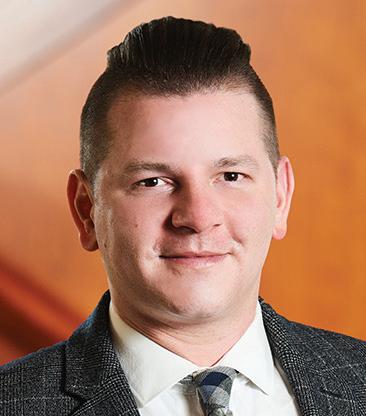
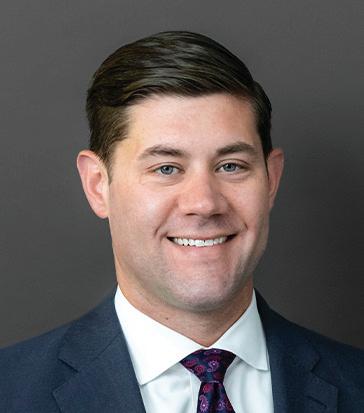
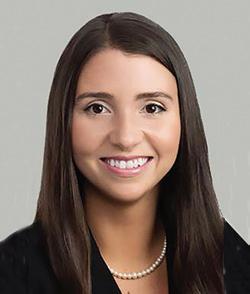
Bryce R. Beard has joined as associate in the energy, utilities and telecommuni cations practice group at the Harrisburg office of Eckert Seamans Cherin & Mellott LLC.
Alexandria Bondy has joined as an associ ate at Philadelphia-based Hofstein Weiner & Meyer PC. ⚖
Allegheny County
Chief Justice Max Baer, 74, Pittsburgh
Baer was elected to the Supreme Court in 2003 and was sworn in as chief justice in 2021. He was to retire at the end of this year, after reaching the mandatory retirement age of 75. Baer was elected to the Allegheny County Court of Common Pleas in 1989. He spent the majority of his time in the court’s family division. Among the many programs he initiated were the Statewide Adoption Network (SWAN), a one judge/one family policy in juvenile court, the CYF family mediation project to facilitate adoptions at the point of termination of parental rights, a Permanency Planning List to pinpoint delays in adoption cases and the Hearing Officer Project to assist judges in the hearing of dependency cases. Baer received multiple accolades for his work. He was named Pennsylvania Adoption Advocate of the Year and PBA Child Advocate of the Year, and President Bill Clinton presented him with the federal Department of Health and Human
Services Adoption Excellence Award for Judicial Innovation. PBA President Jay Silberblatt noted Baer “was known across the country for his dedication to and innovative ideas in juvenile justice. His history, background and commitment to the bar were remarkable.”
Sanford P. Gross,* 86 Pittsburgh
Lackawanna County Irwin Schneider,* 91 Fleetville
Montgomery County Joseph J. McGrory Jr., 64 Limerick
Roseann B. Termini, 69 Wynnewood, a frequent contributor to The Pennsylvania Lawyer
Wyoming County Gerald C. Grimaud, 80 Tunkhannock, a past president of the Wyoming/Sullivan County Bar Association
York County Edward A. Stankoski Jr., 69 York
• Judge, Court of Judicial Discipline
• Former Chairman, Judicial Conduct Board of Pennsylvania

• Former Chairman, Disciplinary Board of the Supreme Court of Pennsylvania
• Former Chairman, Continuing Legal Education Board of the Supreme Court of Pennsylvania
• Former Chairman, Supreme Court of PA Interest on Lawyers Trust Account Board


• Former Federal Prosecutor
• Selected by his peers as one of the top 100 Super Lawyers in Pennsylvania and the top 100 Super Lawyers in Philadelphia




• Named by his peers as Best Lawyers in America 2022 and 2015 Philadelphia


“Lawyer of the Year” Ethics and Professional Responsibility Law and Legal Malpractice Law


Editor’s note: The following were emailed to author [and PBA Quarterly editor] Robert E. Rains regarding his article titled “Disinheriting Pennsylvania’s Children” in the September/October 2022 issue. They appear here with the writers’ permission.
I finished reading your intriguing article on disinheriting children. Thank you very much for an interesting article. I have drafted a number of wills in which my clients have disinherited children who have abandoned them or refused to communicate in some fashion. There’s every reason to protect mi nors who are disinherited, but I [also] see a good reason for a capable testator to be allowed to disinherit a child who has broken the relationship with her or his parent — sometimes. There are other times when the disinheriting seems to be flowing from a religious disagreement or lifestyle choice. That, it seems to me, is a gray area. But the whole topic is certainly worthy of discussion, especially as it affects minors who cannot support themselves. Thanks again.
 Andrew D. Cotlar Doylestown
Andrew D. Cotlar Doylestown
Just finished your article in the current Pennsylvania Lawyer. Well done. You lay out a persuasive case for reexamining our law.
It is interesting that a policy of allowing the disinheritance of children, which presumes the parent prefers that result by not having provided otherwise in the will, sits side by side with the probate code provision giving a “forced” share to “after born” children. So, the testator who gives nothing in his will to his existing children is thereby
presumed to want the child born after he signs his will to have a share! Huh?
Richard Grossman Norristown
Thank you, Professor Rains, for an excellent article on this subject. The information about the present law of the U.K. was par ticularly interesting.
And along these same lines, there’s the Pennsylvania law of adoption of adults. It can be done without notice to anyone: not to the biological parents of the adult in question (who will be disinherited if the adopted adult dies without issue, and/ or who, conversely, may be relying on the intestate laws to ensure that their now legally unrelated issue inherits) nor to the adopter’s biological issue whose share of the adopter’s estate will be reduced.
Both this and the issue you so interesting ly explored, in my opinion, require more legislative scrutiny of the parent-child relationship.
Emeline L.K. Diener Pocono LakeHats off to Tom Wilkinson on an outstand ing and timely article [“Abraham Lincoln: Lessons in Civility, Professionalism and Equality” in the September/October issue]. We live in a time when civility, profession alism and equality are lost on some in our profession. Lincoln taught us and Tom has reminded us of the importance of these at tributes. His article couldn’t be more timely. This excellent article should be mandatory reading for all law students and highly rec ommended for everyone in our profession. Thank you, Tom, for reminding us of what it means to be an attorney and the extremely important role we play in our society.
James T. Davis UniontownEnjoying the recent article on Abraham Lincoln in the September/October edition of The Pennsylvania Lawyer. I particularly liked the author’s emphasis on Lincoln’s reputation for hard work, honesty, civility and professionalism. The article, however, is titled (in part) “Lessons in ... Equality.” American historians have spent consider able time over the past 150+ years trying to determine Lincoln’s views on racial equality. They have realized Lincoln was a man of his time — early and mid-19th century America — a time when most but not all Americans viewed Black people as inferior to white people.
As a person, Lincoln was absolutely op posed to slavery, particularly after visiting the slave markets in New Orleans in 1828. After that visit, he believed that economic equality “rewarding each person, slave or non slave, for his labor” was a laudable and defensible goal. As a politician, howev er, Lincoln in the 1858 senatorial election in Illinois against Stephen Douglas twice repeated the position that “the physical difference between the white and Black races [would] forever forbid the two races living together in terms of social and politi cal equality.”

As stated by David Potter in his 1976 Pulitzer Prize winning book, The Impending Crisis: America before the Civil War — 1848-1861: “Certainly, Lincoln understood that most of his fellow citizens, both in Illinois and in the North generally, might support the abstract idea of emancipation, but not the idea of racial equality.” David Donald in his one-volume Lincoln (consid ered the best single volume on Lincoln) in 1995 wrote, “Lincoln fortunately escaped the most virulent strains of racism [and] when he agreed the Blacks did not have

If you’re a PBA member and you want the legal community to know about your appointment, promotion, recent speaking event or other law-related news, why not submit your announcement to run as a “People” item?
The most frequent types of “People” announcements we run are for appointments/ elections, awards/honors, being published, firm moves and speaking engagements. We run items on recipients of county bar awards, but we do not list county bar commit tee and section appointments. We do not run prospective notices, particularly for speaking or meeting events, as these are subject to change, and we do not include lawyer and law-firm “best of” announcements. Given the PBA’s large member base, we also monitor for how frequently individuals are listed in the column. Photos are welcome. If provided elec tronically, photos should be high resolution. Most electronic photos we receive are as JPEG files.
The editors reserve the right to reject “People” submissions and to edit for style and length of announcement. Accepted announcements will appear in either the PBA’s Pennsylvania Lawyer magazine or Pennsylvania Bar News tabloid, depending on when notices are received in the editorial cycle.
Email “People” column notices to editor@pabar.org or mail to the Pennsylvania Bar Association, Attn. People Column, 100 South St., P.O. Box 186, Harrisburg, Pa. 17108-0186.
the same civil rights as whites, he nearly always added in the next breath that they were the equal of whites in the enjoy ment of the natural rights pledged in the Declaration of Independence.”
It would take another century for a Black man, a son of the South, Martin Luther King Jr., to emerge and to challenge the American people, civilly and professionally, to accept the concept of racial equality — economic, political and social equality. Therein lies one of American history’s great themes and America’s greatest tragedy.
 Daniel R. Schuckers Camp Hill
Daniel R. Schuckers Camp Hill
Editor’s note: The following were emailed to author (and PBA Past President) Thomas G. Wilkinson Jr. regarding his article titled “Abraham Lincoln: Lessons in Civility, Professionalism and Equality” in the September/October 2022 issue. They appear here with the writers’ permission.
Rather than begin my Saturday morning by reading a brief, I opted instead for your ex cellent article on Lincoln. As a fan of most “Lincolnalia,” I greatly appreciated your insights into both the man and what he so often had to say about civility and the need to come together. Lincoln’s memory endures. Let’s hope his message does as well.
A very timely piece, for which I thank you.
Senior Judge D. Brooks Smith U.S. Court of Appeals for the 3rd Circuit of Pennsylvania Duncansville
Just finished reading your very delightful, insightful and comprehensive article on Mr. Lincoln in the [September/October] Pennsylvania Lawyer magazine. I reckon
this work took some time and research. [PBA Past President] Forest Myers and I share lunch together every three weeks or so, and with some sad regularity, we talk about the lack of professionalism and civility that we observe with our colleagues. Civility seems to be on life support; hoping it’s not DOA.
The email address for letters to the editor of The Pennsylvania Lawyer magazine is editor@pabar.org. Letters by mail should be sent to the Pennsylvania Bar Association, Attn. Editor, 100 South Street, P.O. Box 186, Harrisburg, Pa. 17108-0186.
Civil Litigation Section Regional Dinner Nov. 1, Harrisburg

Pennsylvania Civil Procedure: A Primer Nov. 1, various locations and via webcast








Commission on Women in the Profession Fall Retreat Nov. 4-5, Hershey
Business Law Institute Nov. 15-16, Philadelphia and webcast

Board of Governors Meeting Nov. 16, Harrisburg
Committee/Section Chair Board of Governors Reception Nov. 16, Harrisburg
Committee/Section Day Nov. 17, Harrisburg
Pennsylvania Bar Foundation Night Out Nov. 17, Harrisburg
House of Delegates Meeting Nov. 18, Harrisburg
Collaborative Law Lunchtime Q&A Nov. 29, via Zoom
Family Law Section Winter Meeting Jan. 13-15, 2023, Hershey
Board of Governors Meeting Jan. 25, 2023, Lake Buena Vista, Fla.
Midyear Meeting Jan. 25-29, 2023, Lake Buena Vista, Fla.
Please check the PBA calendar at www.pabar.org/site/Calendar for the most current meetings and events information.
















Michael J. Lyon (bottom) of the PBA Law-Related Education Committee and PBA President Jay Silberblatt lead a discussion on Youth v. Gov with students from the Pittsburgh Environmental Charter School.




The Pennsylvania Lawyer is your PBA membership magazine. Our mission is to inform, educate, analyze and provide a forum for comment and discussion.

We’re always looking for informative articles of 2,000 to 3,000 words that help lawyers understand and deal with trends in the profession, offer ways to practice more efficiently and shed light on issues of importance. If you’re interested in writing for us, we’d like to hear from you. To submit an article proposal or request our writer guidelines, email editor@pabar.org or write to Pennsylvania Bar Association, Attn. Editor, The Pennsylvania Lawyer, P.O. Box 186, Harrisburg, Pa. 17108-0186.

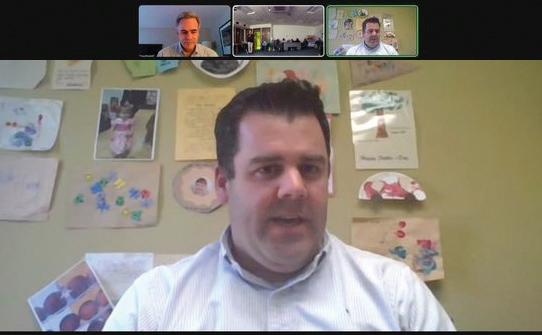

> from page 2
judges with the ideal opportunity to teach a civics lesson to high school students.
The PBA Law-Related Education Committee, chaired by Judge Mark Kearney of the U.S. District Court for the Eastern District of Pennsylvania, has partnered with Teen Screen. Teen Screen’s first display of Youth v. Gov took place in April at the Pittsburgh Environmental Charter School. Following the screening, yours truly and Michael Lyon from the Law-Related Education Committee “Zoomed” into the classroom to discuss the themes of the film and answer questions from the students that touched on subjects ranging from standing to redressability to remedies to appellate review.
The students were inquisitive and inspired by the film. The teachers were appreciative that a couple of real lawyers took time to explain the way our federal civil justice system operates.
The goal of the partnership between Teen Screen and the PBA is to display Youth v. Gov in as many high schools throughout Pennsylvania as possible. Each time the film is screened, PBA-member lawyers/ judges will have an opportunity to meet with the students and talk about our civil justice system, the rule of law and the importance of an independent judiciary. This is a winwin program. The task at hand is to be sure
our Pennsylvania high schools are aware of the opportunity and invite Teen Screen and the PBA into their classrooms. The program is free; it is generously supported by Film Pittsburgh and its many grants.
If you’re interested in this program for your local high school, arrange for the school to contact Teen Screen Director Lori Sisson at lsisson@filmpittsburgh.org to obtain the curriculum materials and schedule a screening date. Once Teen Screen is contacted by the school, it will in turn contact Susan Etter, PBA director of County Bar Services and Special Projects and staff liaison to the Law-Related Education Committee, who will arrange for PBA-member lawyers/judges to visit the classroom in conjunction with the screening of the film.
Helping our high school students better understand how our courts operate and ad vocating for our independent judiciary are core missions for the PBA. Be part of the solution; get your local high school involved in Teen Screen. ⚖
Jay N. Silberblatt PBA PresidentWe’re
a
Bankruptcy Institute 2022
Nov. 11 | 5 sub/1 ethics
Outstanding topics, speakers & updates on recent developments in bankruptcy law in the Eastern & Middle Districts of Pennsylvania— plus quick hits on the top commercial and consumer cases of the year!
Business Law Institute 2022
Nov. 15-16 | 10 sub/2 ethics
Join PBI for our 2022 Business Law Institute, bringing transactional attorneys and in-house counsel throughout Pennsylvania under one roof to learn, share and challenge emerging developments, trends, and practices in the corporate industry.
Nov. 29-30 | 10 sub/2 ethics
Join us for The 29th Annual Estate Law Institute as we continue our tradition of bringing you cuttingedge concepts, current trends, legal updates, first class reference manuals, and top-notch faculty.
Dec. 12 | 4 ethics
All newly admitted Pennsylvania attorneys are required to complete the Bridge the Gap program at an accredited CLE provider prior to their first PA CLE compliance deadline. This course is also a refresher for lawyers, regardless of years in practice. The program is designed to provide basic, yet important, information and insight relative to ethics and professionalism.


Access to over 600 programs from the comfort of your home or office.
Executive Editor: Jeffrey A. Gingerich
Editor: Patricia M. Graybill
People Editor: Andy M. Andrews
Contributing Writers: Fredrick Cabell Jr., Robert A. Creo, David J. Millstein, Barry M. Simpson, Victoria White, Jay N. Silberblatt, Thomas G. Wilkinson Jr.

Design: Kelly Cassidy-Vanek, Cassidy Communications Inc. www.cassidycomm.com; Bethlehem, Pa.
Display Advertising: PBA Communications Department; Phone: 800-932-0311, ext. 2226.
Classified Advertising: PBA Communications Department; Phone: 800-932-0311, ext. 2226.
Views expressed in The Pennsylvania Lawyer do not neces sarily reflect the official views or policies of the Pennsylvania Bar Association. The appearance of a product or service advertisement herein does not constitute an endorsement of the product or service by the Pennsylvania Bar Association. The Pennsylvania Lawyer welcomes editorial submissions from members of the bar. Letters to the editor from readers on all topics concerning the legal profession are welcome. The publisher reserved the right to select letters to be published. Letters may be edited for length and style.
Editorial items and correspondence should be mailed to the Pennsylvania Bar Association, Attn. Lawyer Magazine Editor, 100 South Street, P.O. Box 186, Harrisburg, Pa. 17108-0186. Telephone: 800-932-0311. Email address: editor@pabar.org. Unsolicited manuscripts will not be returned unless accompa nied by a self-addressed, stamped envelope.
The Pennsylvania Lawyer is distributed to all PBA members as a membership benefit. Subscription is $30 per year. To join the PBA, call 800-932-0311. The Pennsylvania Lawyer is underwritten in part by the Pennsylvania Bar Insurance Fund. Soy-based inks used in printing.

OFFICERS
President: Jay N. Silberblatt
President-elect: Michael J. McDonald
Vice President: Nancy Conrad
Immediate Past President: Kathleen D. Wilkinson
Chair, House of Delegates: Jonathan D. Koltash Secretary: Jacqueline B. Martinez Treasurer: James R. Antoniono
YOUNG LAWYERS DIVISION REPRESENTATIVES
Chair: Patrice M. Turenne
Chair-elect: Jennifer A. Galloway
Immediate Past Chair: Paul D. Edger
GOVERNORS
Minority Governor: Rodney R. Akers
Minority Governor: Judge Cheryl L. Austin
Unit County Governor: Matthew M. Haar
Woman Governor: Amy J. Coco
Zone 1: Jennifer S. Coatsworth
Zone 2: Eric M. Prock
Zone 3: Lisa M. Benzie
Zone 4: John P. Pietrovito
Zone 5: Sean P. McDonough
Zone 6: Judge Damon J. Faldowski
Zone 7: John F. Alcorn

Zone 8: Christopher G. Gvozdich
Zone 9: Carolyn R. Mirabile
Zone 10: Melissa Merchant-Calvert
Zone 11: Adrianne Peters Sipes
Zone 12: Lawrence R. Chaban
Chair: Bernadette M. Hohenadel; Vice Chair: Judge William I. Arbuckle III; Members: Emeline L.K. Diener, Mary Wagner
Fox, Richard J. Frumer, Judge Thomas King Kistler, Peter W. Klein, Alyson Tait Landis, Stephanie F. Latimore, Michael J. Molder, Catherine R. O’Donnell, Riley H. Ross III, Cheri A. Sparacino, Jill M. Spott, Ryan W. Sypniewski, Andrij V.R. Szul, Zanita Zacks-Gabriel; Board of Governors Liaison: Jonathan D. Koltash
PBA Staff — Executive Director: Barry M. Simpson; Deputy Executive Director: Francis J. O’Rourke; Director of Communications: Jeffrey A. Gingerich; Director of CLE Content Delivery: Erika Bloom; Director of CLE Content Development: Clair A. Papieredin; Director of County Bar
Services & Special Projects: Susan E. Etter; Director of Finance: Lisa L. Hogan; Director of Information Technology: Terry Rodgers; Director of Legislative Affairs: Fredrick
Cabell Jr.; Director of Meetings: Wendy A. Loranzo; Director of Member Services: Karla Andrews; Director of Western Pennsylvania Services: Bridget M. Gillespie
June 25 through August 19, 2022

Following review and approval of the joint petition in support of discipline by a three-member panel of the Disciplinary Board, the Supreme Court of Pennsylvania on Aug. 4 ordered Timothy Nicholas Tomasic subject to a public reprimand on consent and probation for two years, sub ject to conditions including his abstinence from drugs and alcohol, attendance at weekly meetings of Narcotics Anonymous and the appointment of a sobriety mon itor. According to the disciplinary report, Tomasic was charged with violations of the Rules of Professional Conduct including failure to provide competent representa tion, failure to act with reasonable diligence and promptness, and that a lawyer shall not represent a client or shall withdraw from the representation if the lawyer’s phys ical or mental condition materially impairs the lawyer’s ability to represent the client. According to the report, in reaching the recommendation for discipline, the panel considered as an aggravating factor that Tomasic failed to comply with the Office of Disciplinary Counsel’s (ODC’s) multiple requests for documentation regarding his pursuit of sobriety and, as mitigating
factors, his lack of prior discipline and that he accepted responsibility for his miscon duct by virtue of his consent to the imposi tion of a public reprimand with probation. The report also indicated that if the matter were to proceed to a disciplinary hearing, Tomasic would seek to establish that his substance use disorder was a causal factor in his misconduct per Office of Disciplinary Counsel v. Seymour H. Braun; that “the facts of this case would also support a finding of Braun mitigation” and, if the matter were to proceed to a disciplinary hearing, that he and others would testify to his sobriety since December 2021 and his regular attendance at Narcotics Anonymous meetings. The panel concluded that that the recommended sanction “satisfies the primary purpose of the disciplinary system in that it would notify the public that [his] drug use adversely impacted his represen tation of a client while also protecting future clients from the possibility of such adverse impacts through monitoring to detect future drug use.”
The Supreme Court of Pennsylvania on July 5 ordered Anthony Hugh Rodriques subject to a public reprimand with conditions including that he submit proof that he has made payment to his client in the relevant matter to the Disciplinary Board prothono tary and ODC and that he return all of the client’s documents.
Following review and approval of the joint petition in support of discipline by a three-member panel of the Disciplinary Board, the Supreme Court of Pennsylvania on Aug. 5 ordered Steven Ronald Savoia subject to a public reprimand. According to the disciplinary report, Savoia’s mis conduct involved violations of the Rules of Professional Conduct and Rules of Disciplinary Enforcement including failure
to act with diligence and promptness, failure to consult with the client and to keep the client informed, and failure to respond to the ODC’s request for a statement of po sition. In reaching the recommendation for discipline, the panel considered Savoia’s disciplinary history, which included two in formal admonitions for misconduct similar to the instant case, as well as his remorse and consent to discipline, and concluded that “prior disciplinary intervention has not been sufficient to abate [his] misconduct, suggesting more serious discipline is nec essary. Precedent supports the imposition of public discipline, without suspension, for attorneys who engage in neglect and failure to communicate and have a record of private discipline.”
EMERGENCY TEMPORARY SUSPENSION — Rule 208(f)

The Supreme Court of Pennsylvania ordered the following attorneys placed on emergency temporary suspension: Manrico A. Troncelliti Jr., Montgomery County, on July 1; Brian M. Puricelli, Bucks County, on July 11.
TEMPORARY SUSPENSION — Rule 214
The Supreme Court of Pennsylvania ordered the following attorney placed on temporary suspension under a rule of disci plinary enforcement pertaining to attorneys convicted of a crime: Brad J. Koplinski, Cumberland County, on Aug. 10. Justice Kevin M. Dougherty did not participate in the consideration or decision of the matter.

215
The Supreme Court of Pennsylvania ordered the following attorneys disbarred on consent under a rule of disciplinary enforcement pertaining to resignations by attorneys who are being investigated for allegations of misconduct: Nicholas Urick, Beaver County, on Aug. 10; Royce W. Smith, Philadelphia,
•
•
•
•
•
•
•




More than 900,000 lawyers nationwide turn to Fastcase to smartly complete their legal research needs. Fastcase proudly partners with over 50 national, state, and county bar associations to provide a comprehensive books, treatises, and journals available to meet their practice needs, along with partner service integrations such as Docket Alarm, HeinOnline, LexBlog, Clio, Courtroom Insight, and TransUnion. See today why Fastcase is a smarter way to legal research. We provide our users with unlimited usage, unlimited service support – all at no additional cost.





Fastcase puts the whole national law library on any internet connected device with cloud-based access to cases, statutes, regulations, and can be viewed at Fastcase.com/coverage.







on Aug. 16, following his temporary suspen sion on April 8.

The Supreme Court of Pennsylvania imposed reciprocal discipline on the following attorneys: Michael Nielson Behunin, Sandy, Utah, disbarred, on July 28, for like discipline imposed by the Utah Supreme Court; Charles Kevin Blackmon, Greensboro, N.C., disbarred, on July 28, for like discipline imposed by the Council of the North Carolina State Bar; Alfred DiGirolomo Jr., Garden City, N.Y., disbarred, on July 28, for like discipline imposed by the Supreme Court of New York, Appellate Division, Second Judicial Department; Arthur P. Fisch, Brooklyn, N.Y., disbarred, on July 28, for like discipline imposed by the Supreme Court of New York, Appellate Division, Second Judicial Department; Thomas A. Fadner II, Sioux City, Iowa, disbarred, on Aug. 5, for like discipline im posed by the Supreme Court of Wisconsin; Freddie Jay Berg , New York, N.Y., disbarred, on Aug. 16, for like discipline imposed by the Supreme Court of New York, Appellate Division, Second Judicial Department; James Thomas Hytner, St. James, N.Y., disbarred, on Aug. 16, for like discipline imposed by the Supreme Court of New York, Appellate Division, Second Judicial Department; Vincent J. Mitchell, Coventry, R.I., disbarred, on Aug. 16, for like disci pline imposed by the Supreme Court of Rhode Island; Daniel Warren Morse Jr., Milwaukee, Wis., suspended for one year and one day, on Aug. 16, for like disci pline imposed by the Supreme Court of Wisconsin.




The Supreme Court of Pennsylvania granted reinstatement to Herbert Karl Sudfeld Jr., Bucks County, on Aug. 11, from a four-year suspension on consent, as recommended by the Disciplinary Board. Chief Justice Max Baer and Justice P. Kevin Brobson dissented from the court’s order. According to the reinstatement report, Sudfeld was ordered suspended on June 22, 2020, retroactive to April 8, 2016, the date of his temporary suspension relat ed his conviction for insider trading and making false statements to authorities. As indicated in the report, at the reinstatement hearing Sudfeld “accepted full responsi bility for his misconduct and expressed genuine remorse for his criminal conduct and the embarrassment he caused to the profession, his law partners, his family and friends,” “expressed a sincere desire to earn back the respect of the legal com munity, which he ably served for nearly 40 years prior to his suspension” and present ed seven character witnesses who provided credible testimony as to his moral qualifica tions and fitness to resume the practice of law. The board determined that “although [Sudfeld’s] misconduct represented a seri ous breach of his professional ethics, … we conclude that he has met his reinstatement burden … [He] presented clear and convinc ing evidence that he spent his suspension period engaged in genuine rehabilitation and he is fit to be reinstated to the practice of law through demonstration of his moral qualifications, competence, and knowledge in the law.”⚖
The recent disciplinary actions of the court are posted at https://www.padisciplinary board.org/cases/recent-cases


It pays to advertise in the ‘Marketplace,’







































































































































































As my career as Pennsylvania Bar Association executive director enters its last few months, I want to make sure I prioritize comments about my appreciation of the unparalleled PBA staff. Over the years, I have observed that at times like this, an outgoing thanks to staff is frequently relegated to just a few closing remarks. That cannot and will not be the case here. That is because all the great work and accomplishments of the individual PBA volunteers, sections, committees, YLD and other PBA entities run through the highly professional efforts of the PBA staff — many times through one staff person, but far more frequently through their team efforts. Indeed, at most times the team effort is such that only nominal direction is required by senior staff.
I generally view my role as the executive director is to make sure we continue to have great and talented staff members, provide them with the resources we can afford to ac complish the tasks at hand and then stay out of the way. I can do this because I have the utmost confidence in the skills and initiative of the PBA staff. American Bar Association bar executive programs routinely featured a presenter who said a great association staff member is one who always anticipates what needs to be done, takes the initiative and is so far out in front that the volunteers occasionally have to reel him/her back in as opposed to the volunteers having to look over their shoulders and urge the staff member to hurry to catch up. By that measure, our PBA staff seldom fail to perform. And if they do, it is almost always because they have so many balls in the air that some serious juggling is required. As managers, it is our job to keep that juggling to a minimum and, when need be, to help catch any balls that appear to be getting lost in the air. I assure you that has not happened often!
The “PBA staff” is often mentioned as if it is one never-changing unit. Of course, it is anything but that. Nevertheless, we have been fortunate that stability and longevity are hallmarks of our staff. For example, five current staff members were here when I ar rived in 1999 — some have been with the PBA 15 or 20 years more than I have. Of course, as the times change, along with the way law is practiced, the staff evolves. Existing staff members learn new skills; new hires add even more skills. It has always been my pleasure to see staff members working together, almost like a family.
The last nearly three “pandemic” years have, of necessity, brought a number of changes to the PBA staff. Many of you experienced some thing similar at your offices. The pandemic hit at the same time that we were midway through absorbing the Pennsylvania Bar Institute back into the PBA to make it more efficient and cost effective as the continuing legal education department of the PBA. Both that merger and the pandemic resulted in the shrinking of the number of staff. What did not shrink were the services and programs the PBA provided to our members, to other lawyers and judges and the general public. Technology, Zoom and fewer live meetings and CLE programs permitted a reduction in staff. But so did the willingness of individual staff members to take on more responsibilities. For that we all should be thankful and appreciative. I certainly am.
I will miss working with the talented and dedi cated staff listed on the next page. I hope they permit me to come by and say hello from time to time. I will remain a member even after my retirement from the PBA and will continue to appreciate all that they do for the attorneys and citizens of Pennsylvania.
“
”
I am frequently asked what made working at the PBA enjoyable, and my response has been that at the end of the day, when we put our head on the pillow, we know that in both big and small ways, we all made the commonwealth a better place.
I am frequently asked what made working at the PBA enjoyable, and my response has been that at the end of the day, when we put our head on the pillow, we know that in both big and small ways, we all made the commonwealth a better place. So, I will tell my fellow staff members to continue to enjoy their days at the PBA, as I have, and at the end of each day, rest well. They all deserve it.⚖
 Barry M. Simpson Executive Director
Barry M. Simpson Executive Director
Jason Adams
Tameka Altadonna
Andy Andrews
Karla Andrews
Joel Bailey
Diane Banks
Megan Barrick
Erika Bloom
Taylor Burton
Randall Byler
Fredrick Cabell Jr.
Adriane Davis
Lauren Derrick
Maria Engles
Susan Etter
Becky Frank
Bridget Gillespie
Jeffrey Gingerich
Sandra Graver
Patricia Graybill
Ashley Heffernan
Garrett Helf
Lisa Hogan
Karen Hoover
Christian Ierley
Andrew Jamouneau
Anita Jones
Coleen Jones
Elijah Jones
Lisa Jones
Pamela Kance
Anna King
Karen Kreis
Carrie Larock
Kyle Leach
Wendy Loranzo
Jennifer McCreary
Kevin McVeigh
Lucas Mace
Ursula Marks
Ross Miller
Gabriele Miller Wagner
Nathan Morneau
April Murphy
Jillian O’Connell
Francis O’Rourke
Clair Papieredin
Susan Pesavento
Katey Rhone
Melissa Roane
Terry Rodgers
Tina Schreiber
Joanne Schumacher
Kate Sherman
Rebecca Silvia
Barry Simpson
Julie Sipe
Paul Skolka
Melisa Spinelli
Logan Stover
Sabine Tate
Stacey Thomas
David Trevaskis
Amanda Tucci
Adam Tulibacki
Vincent Wallace Jr.
Cassandra Ward
Julia Weaver
Holly Wertz
Victoria White
Susan Wolf
Philip Yerger
Jennifer Zeigler

The duties of an agent are set forth in 20 Pa.C.S. Section 5601. Among the agent duties set forth in that section are the agent’s obligations to: 1) keep a record of all receipts, disbursements and transac tions made on behalf of the principal; 2) act so as not to create a conflict of inter est that impairs the agent’s ability to act impartially in the principal’s best interest and 3) attempt to preserve the principal’s estate plan to the extent actually known by the agent, if preserving the plan is consistent with the principal’s best interest based on all relevant factors.
This article discusses a few significant cases, including a 2021 case, that show how courts have applied these statutory principles in specific circumstances. The cases illustrate the traps that await unwary agents and provide lessons for agents and their attorneys to consider in their efforts to reduce agent exposure to liability.

Under 20 Pa.C.S. Section 5610, courts have discretion to order agents subject to the provisions of 20 Pa.C.S. Chapter 56 to file accounts of their administration: An agent shall file an account of his administration whenever directed to do so by the court and may file an account at any other time. All accounts shall be filed in the office of the clerk in the county where the principal resides. The court may assess the costs of the accounting proceeding as it deems appropri ate, including the costs of preparing and filing the account. (emphasis added). 20 Pa.C.S. § 5610 (2022).
Case law makes clear that a court may order an agent under a power of attorney to file an accounting even if a petitioner lacks standing to do so. In re Dardarian, 2013 Pa. Dist. & Cnty. Dec. LEXIS 292, *4, 29 Pa. D. & C. 5th 316, 320 (2013).
In Dardarian, an 82-year-old mother residing in a nursing home made a friend her power of attorney. According to the court, before executing the power of attorney, Dardarian executed a will in which she excluded her daughter and a later will in which she left her estate equally to her agent under the power of attorney (POA) and three other friends.
Almost two years after Dardarian named her friend as an agent under her power of at torney, her daughter petitioned the Chester County Orphans’ Court to order the agent to file an account of her administration of Dardarian’s finances. The court noted that the daughter did not disclose to the court when she filed her petition that she had fallen out of favor with her mother.
According to the court, Dardarian had executed a will in which she specified that her daughter was excluded. In a later will, Dardarian specifically excluded her daughter and grandsons from her estate.

Dardarian’s daughter filed a petition in the Chester County Orphans’ Court seeking an order requiring the agent under the power of attorney to file an accounting. The court noted that the parties had agreed that the agent would file an accounting and ordered that the agent file the accounting in compli ance with local county rules.
The court said that there was no allega tion in this case that Dardarian was not in
possession of her faculties or that her mind had been imprisoned by the machinations of another. To the contrary, Dardarian made no accusations against her agent, filed a sworn affidavit affirming that she gave the daughter a significant gift, acknowledged an awareness that her agent was being paid $800 per week for services rendered to her under the power of attorney and expressed her overall satisfaction with the agent’s services, according to the court.
Discussing the issue of standing, the court concluded that any inquiry into the alleged misuse of a power of attorney is properly made by the principal, who granted the power, or by the personal representative of his or her estate after the principal’s death. The court further noted that for persons who have been adjudicated as incapacitated, their guardians succeed to the necessary standing to compel accountings.
Discussing precedents, the court stated that a beneficiary whose interest was al legedly damaged by the exercise of a power
A court may order an agent under a power of attorney to file an accounting even if a petitioner lacks standing to do so.
of attorney has no standing to demand an accounting. Moreover, the court cited Rosewater Estate, 25 Fid. Rep. 2d. 83 (O.C. Mont. Co. 2005), which involved a chal lenge to an agent’s withdrawal of funds from a decedent’s trust, for the proposition that a close blood relative or an intestate heir of the principal does not necessarily have standing to demand an accounting from the principal’s agent.
In Rosewater Estate, stepsons of the decedent, Mrs. Rosewater, were remaind ermen of a marital trust created in her will. The marital trust gave Mr. Rosewater “the unlimited right, fully exercisable at any time following my death, whenever and as often has he may wish, to withdraw as much of the principal as he may request in writing.”
Pursuant to a power of attorney, Mr. Rosewater’s agents, who were two of his children, withdrew all of the assets in the trust, which were valued at over $5 million, leaving nothing for his stepsons to inherit upon his death. The court said that had the
withdrawal not been made, the stepsons would have received two-thirds of the assets.
Rejecting the stepsons’ petition on the ba sis of their lack of standing, the Rosewater court noted that any court-imposed sur charge would benefit the decedent’s estate, not the decedent’s late wife’s marital trust nor his stepsons. The Orphans’ Court held that the stepsons had no substantial, direct and immediate interest in any dispute over whether the decedent’s power of attorney agents acted appropriately by directing the withdrawal of funds from the marital trust.
Citing precedents, the court stated that the stepsons’ lack of a substantial, direct and immediate interest required that their petition be rejected on standing grounds. Accordingly, the Rosewater court held that the stepsons lacked standing to raise a breach of fiduciary duty claim and sustained the estate’s preliminary objections.
Relying on Rosewater, the Dardarian court rejected Dardarian’s daughter’s petition.
But although the court rejected the daugh ter’s petition for an accounting, the court nevertheless ordered Dardarian’s friend and agent to file an accounting in the proper format for the court’s review.
Key Point: The court ordered the agent to file an accounting with the court despite the daughter’s lack of standing. This case illustrates that the Orphans’ Court has wide discretion to order an accounting even when a petitioner lacks standing.
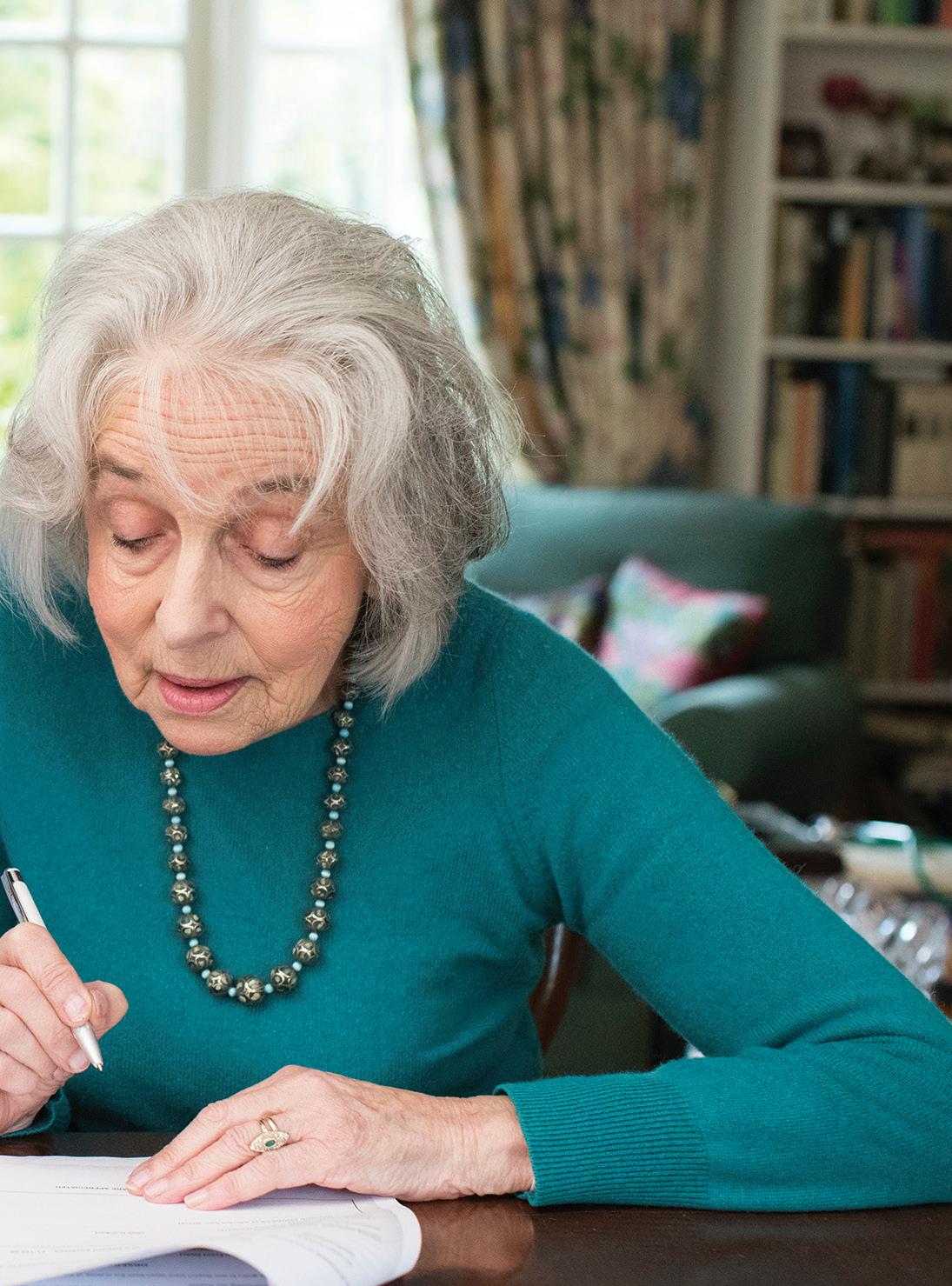
In Estate of Newcomer, 121 A.3d 1127, Pa. Super. Unpub. LEXIS 881 (Pa. Super. Ct. Apr. 10, 2015) (unpublished), the Pennsylvania Superior Court affirmed an Orphans’ Court finding that the agent under a power of attorney attempted to deprive his father’s paramour of 28 years of an annuity specifically set aside for her through a purported beneficiary change.

Less than one year after Newcomer named his girlfriend as the sole beneficiary of an annuity, he executed a power of attorney that named his son his attorney in fact and agent. Soon thereafter, his son/agent executed a beneficiary change request form that removed the girlfriend as beneficiary of annuity proceeds and named himself and his brother as the beneficiaries of the annuity.
About five months later, Newcomer died testate. Later that year, his last will and testament was filed in the Fayette County Orphans’ Court.
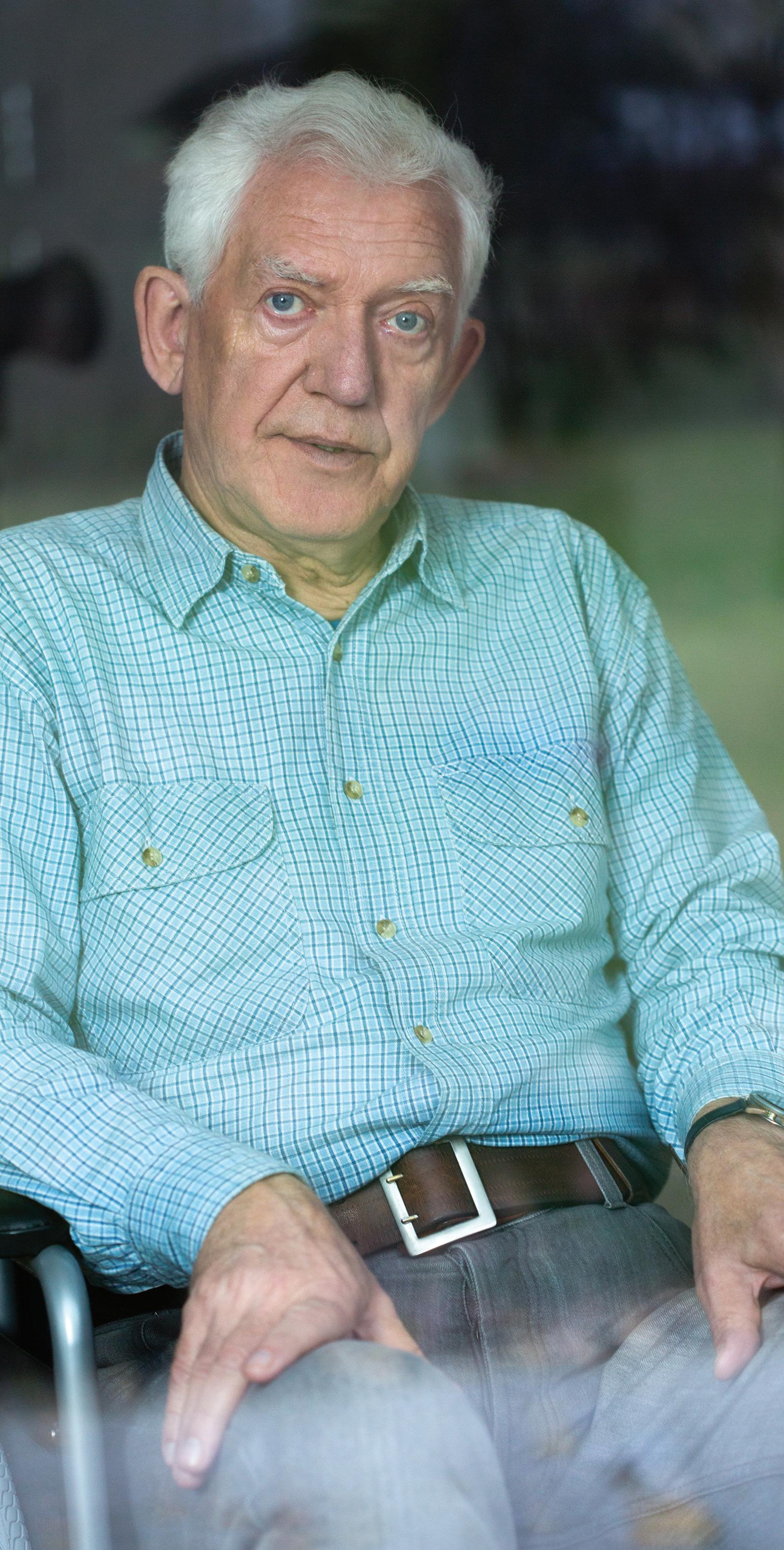
That same year, Newcomer’s girlfriend petitioned the Orphans’ Court to issue a rule to show cause in an effort to recover approximately $40,000 in annuity proceeds that were payable on his death. According to the court, the annuity had originally named the girlfriend as the sole beneficiary.
The Orphans’ Court issued a rule directing the sons to show cause why the $40,000 annuity should not be paid to the girl friend. According to the Superior Court, the Orphans’ Court had concluded that, despite the authority granted to the agent/son, pursuant to the power of attorney to make beneficiary changes, the son had engaged in deception and attempted to commit a fraud by improperly signing his father’s name on a beneficiary change request form.
The court noted that the decedent’s son had not signed his own name as attorney in
fact pursuant to a power of attorney when he signed the form, but instead signed his father’s name with no indication that he had done so. The Orphans’ Court concluded that the son’s failure to sign the form properly made the beneficiary change request form a nullity.
Citing this agent misconduct, the Orphans’ Court ordered the annuity be paid to the girlfriend. The sons then appealed to the Superior Court, alleging, in part, that the beneficiary change form signed by the agent of the deceased was valid to change the beneficiary of the annuity.
Rejecting the son’s appeal, the court af firmed the Fayette County Orphans’ Court’s decision that the son/agent had engaged in deception. The Superior Court upheld the Orphans’ Court’s finding that, by signing his father’s name on the beneficiary change form without acknowledging he was signing pursuant to a power of attorney that had named the son as his father’s agent, the son had attempted fraud.
The Superior Court acknowledged that the power of attorney explicitly authorized the son/agent to change beneficiary designa tions. The court noted, however, that the son did not sign his name as an agent pursuant to the power of attorney, but instead simply signed his father’s name.
The court found that by signing his name, without designating himself as “Jr.” — as set forth in the power of attorney that gave him
the authority to act for his father — and by failing to refer to the power of attorney — the son/agent disavowed the power of attorney as a source of authority.
Finding that the son tried to pass off his signature as his father’s, the Superior Court held that the son/agent had attempted to convert the annuity to an asset of his and his brother’s and failed to keep accurate records as to who actually signed the benefi ciary change request concerning that asset. Based on that holding, the court concluded that the beneficiary change form signed by the agent of the deceased was invalid to change the annuity beneficiary. The court also concluded that the son/agent violated his fiduciary duty as an agent to carry out the wishes of his father.
Key Point: The Superior Court focused on whether the agent of the power of attorney signed his name as POA. The Superior Court’s opinion suggests that if the agent had inserted those three letters — POA — after his signature on the beneficiary change form, the agent’s actions would perhaps have been insulated from legal challenge.
The Pennsylvania Superior Court recently surcharged an agent for taking actions that were inconsistent with the principal’s estate
plan. The court found that the principal had not authorized the agent’s actions with full knowledge of the relevant facts. In re Estate of Waite, 260 A.3d 143 (Pa. Super. Ct. 2021).
The Superior Court concluded that the record supported the trial court’s finding that the agent’s actions created a conflict of interest under 20 Pa.C.S. § 5601.3(b)(2). The Superior Court upheld the trial court’s decision to surcharge the agent for her conflict of interest.
Summarizing the case record, the court not ed that the decedent, Eric Waite, had lived on a working farm with his wife. He and his wife, who had died earlier, had one daugh ter and two sons. One of the sons, James, married and later divorced the appellant in this case, who was Eric’s agent.
The court record indicated that Eric’s daugh ter-in-law called him to ask for help after she and James had a domestic dispute. After Eric picked her up, she lived with him and his wife at his farm for an undisclosed period.
According to the court, a few weeks after executing a will, Eric was admitted to the hospital. He was suffering from acute deliri um resulting from severe dehydration.
A hospital social worker advised Eric that he could no longer live by himself, although the court said that he had apparently regained
Prudent agents should take care to disclose all relevant facts that might reasonably affect decisions of the principal.
his mental faculties after the hospitalization. Eric moved in with his daughter-in-law and James while they searched for a long-term care facility, according to the court.
While living with his daughter-in-law, Eric signed a power of attorney naming her as his agent. According to the court, the drafter of the power of attorney was an experienced estate attorney who had prepared hundreds of powers of attorney, had spoken with Eric at some length before preparing the power of attorney naming his daughter-in-law as his agent and had determined that Eric had the capacity to execute the document.
The court noted that after drafting the power of attorney, at Eric’s direction, his daughterin-law took him to his credit union, where he asked the teller to remove his daughter and add his daughter-in-law as the power of attorney and designated beneficiary of his checking and savings accounts. The court said that the daughter-in-law did not join the discussion until after the account change card was completed.
After becoming a resident at a care facility, Eric sold his farm and equipment. At his direction, his daughter-in-law deposited the proceeds of that sale into his savings
account, the court said. Soon thereafter, Eric executed a codicil to the will naming his daughter-in-law the executor of his will, with her husband James’ agreement.
The Superior Court noted that Eric’s daugh ter-in-law later divorced James, but never informed her father-in-law of the divorce, ac cording to the trial court. The Superior Court focused on one key finding: Eric apparently never had the opportunity after that divorce to make a fully informed decision regarding whether he wanted to remove his former daughter-in-law as his power of attorney or as a one-third beneficiary of his estate.
After his father’s death, James learned that his former wife was the sole beneficiary of his father’s credit union accounts. During the Orphans’ Court litigation that ensued after Eric’s death, his daughter-in-law claimed that, pursuant to the Multiple-Party Accounts Act (MPAA), 20 Pa.C.S. §§ 63016306, she was legally entitled to all of the proceeds of her father-in-law’s credit union accounts.
The court noted that even though the daugh ter-in-law was a one-third beneficiary of the estate, the credit union accounts contained a significant amount of the estate. The court

said that James had apparently testified credibly that had he known sooner that his former wife was his father’s designated beneficiary, he would have challenged the power of attorney and made sure that his father’s credit union accounts became part of his father’s estate.
Challenging the daughter-in-law’s actions as agent, the other two beneficiaries of the will, Eric’s daughter and James, filed a petition in the Orphans’ Court seeking, among other things, rescission of agent actions taken under the power of attorney. They claimed that the daughter-in-law, in designating herself as the beneficiary of the credit union accounts, engaged in unfair dealing, exerted undue influence over her father-in-law and violated her duties under the power of attorney.
The Superior Court noted that at the trial court hearing on the petition, counsel for the other beneficiaries examined the daughterin-law regarding the deposit of her father-inlaw’s funds into the credit union accounts and her failure to create a separate account. Rejecting the daughter-in-law’s procedural arguments, the Superior Court concluded that even if the other beneficiaries failed
Traps await unwary agents.
to plead that the daughter-in-law breached the power of attorney based on a conflict of interest or commingling assets, the trial court was entitled to consider that evidence.
The Superior Court upheld the Orphans’ Court’s findings that the daughter-in-law understood that her being her fatherin-law’s sole beneficiary for a significant portion of his assets, namely the proceeds of the credit union accounts, was inconsis tent with the three-part distribution plan of his will. According to the Orphans’ Court, the daughter-in-law knew that Eric planned to leave her a third of the assets and wanted to divide the other two-thirds of his estate between his son James and James’ sister.
The Superior Court also upheld the Orphans’ Court’s findings that the daughterin-law 1) failed to keep her assets separate from her father-in-law’s; 2) kept her status as the sole credit union beneficiary designa tion a secret from her then-husband James and his sister; 3) knew that, contrary to her father-in-law’s estate plan, her divorce from James would ensure that James would have no right to the proceeds of the credit union accounts and 4) favored her own interest
in the credit union proceeds ahead of her father-in-law’s interests as expressed in his will.
Concluding that the record supported the Orphans’ Court’s finding that the daughterin-law had a conflict of interest, the court said there was no abuse of discretion or legal error in the trial court’s determina tion that she placed her own self-interest ahead of the interests of her father-in-law. The Superior Court therefore affirmed the Orphans’ Court’s decision to direct the daughter-in-law to restore the credit union accounts to her father-in-law’s estate for distribution as a surcharge for her conflict of interest.
Key Point: Agents may be subject to sur charge if they take actions: 1) without the full and informed consent and authorization of the principal, 2) that are inconsistent with the principal’s estate plan and 3) wherein the agent appears to have a conflict of inter est with respect to those actions. Prudent agents should also take care to disclose all relevant facts that might reasonably affect decisions of the principal and explain and document any actions of the principal or agent that are inconsistent with the princi pal’s stated wishes and estate plan.
The case law concerning agent obligations illustrates at least three important points: 1) the Orphans’ Court has wide discretion to order an accounting even if no petitioner with standing requests an accounting; 2) power of attorney agents must determine the extent of their authority and comply with the statutory formalities when acting as agents; and 3) agents who are found to have received a financial benefit by having placed their interests above those of their principals may be surcharged. ⚖
John B. Spitzer, a Pennsylvania attorney based in Merion Station, works for Scribe Inc., which offers editorial and production services to a wide range of legal, religious and association publishers. The views expressed in the article are personal.

If you would like to comment on this article for publication in our next issue, please send an email to editor@pabar.org.

Joel D. Feldman is 20 minutes into a presentation on distracted driving to a group of parents and their teenage children when he gets to the heart of his talk.
He asks the young people how they react when, while on the road, they see a driver in a nearby car texting, oblivious to the very real possibility that their inattention might at any moment cause a crash that could kill or hideously disfigure themselves or others.
They use words like “disrespectful,” “rude” and “selfish.”
When he turns to the parents, though, he gets a different reaction. Theirs, likely reflecting life experience, is more analytical, not so much from the heart. “Risky,” said one. “Dangerous,” said another. “Reckless,” answered a third.
Feldman has given hundreds of such talks, and it is very rare for adults to respond in the more intuitive way of their children. And that, he believes, with plenty of research to

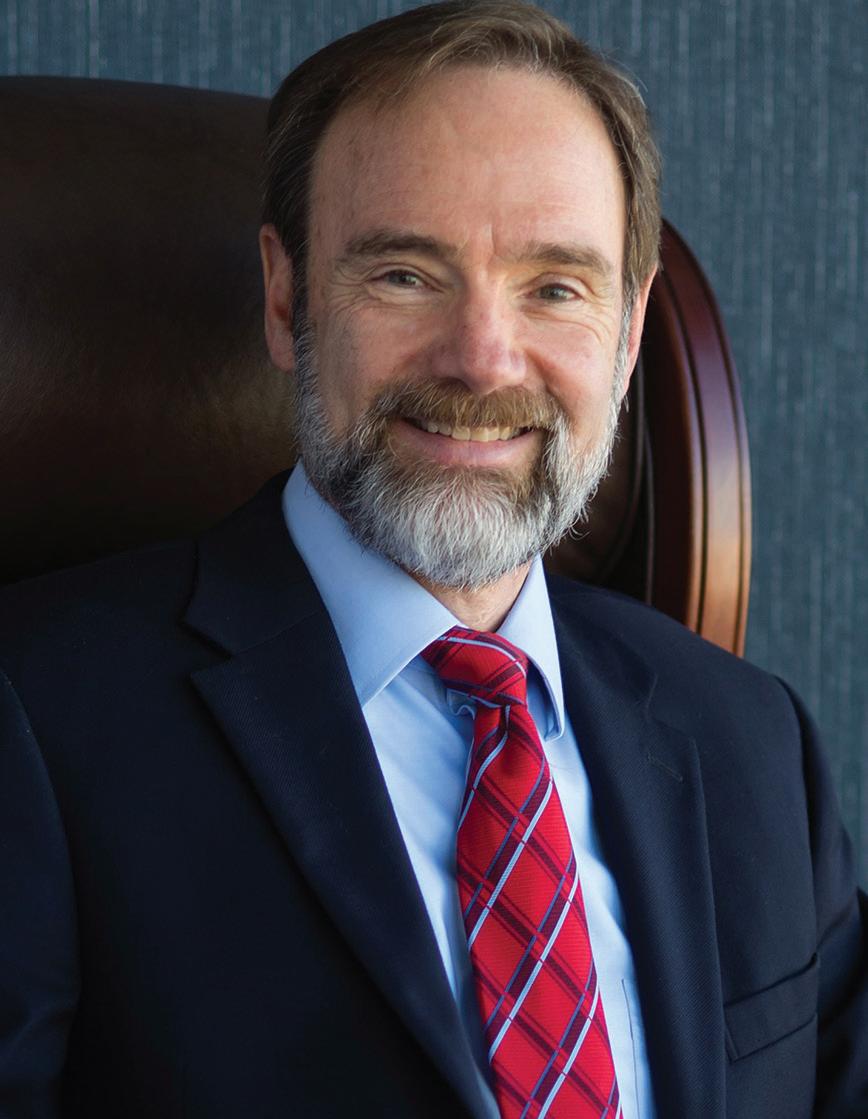 By Chris Mondics
By Chris Mondics
back him up, is a key to changing driver habits of texting, talking on a cellphone or other distracted driving practices that cause on average some 3,000 traffic fatalities a year.

“We don’t think it is dangerous when we do it,” Feldman says. But, touching on the peculiar cognitive dissonance that defines distracted driving practices that run the gamut from texting to eating lunch while at the wheel, Feldman adds, “We are angry when we see other people do it.”
Feldman, a personal injury lawyer at Center City Philadelphia’s Anapol Weiss, has come to the subject painfully. His 21-year-old daughter Casey, a beautiful, vivacious communications major at Fordham University, was run over in a crosswalk in Ocean City, New Jersey, by a van on July 17, 2009. She died in the hospital a few hours later.
The driver of the van, a snack deliveryman, who accord ing to the only eyewitness, had rolled through the stop sign, had taken his eyes off the road for a moment as he
apparently reached for his GPS and struck Casey when she was two-thirds of the way through the crosswalk. There was no evidence of drug or alcohol use by the driver, and the call log showed that he was not on the phone at the time.
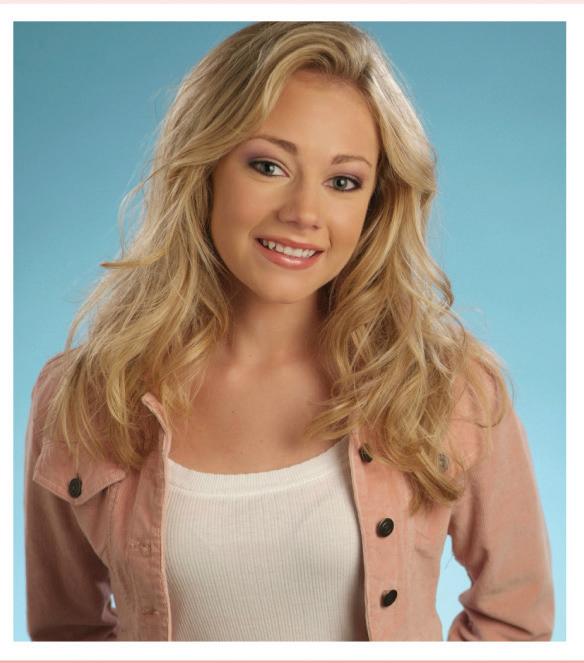

He was charged with careless driving and failing to yield to a pedestrian.
Casey’s loss was a devastating blow for Feldman, his wife Dianne and their son Brett. It spurred Feldman to take on the subject of distracted driving and, since that time, he’s become a leading national voice on the subject. His efforts, which have been recognized by the federal Department of Transportation, helped spur further research on the subject and galvanized many employers to stress the importance of attentive driving. He and Dianne established the Casey Feldman Foundation and set up the website EndDD.org to deepen public understanding of the harm of distracted driving and to promote ways of persuading the public to put down their phones and pay more attention to the road.
In all, Feldman has given talks to more than 200,000 people since he started the campaign. Other public speakers affiliat ed with EndDD.org, including hundreds of lawyers, have reached 300,000 more. In Pennsylvania alone, the program has reached more than 68,000 people.
“There are so many more opportunities in Pennsylvania for lawyers to do this kind of work,” Feldman said.
Feldman brings a certain authority and verve to his presentations, and his audience typically is receptive.
He runs the 50-minute sessions as a kind of Socratic dialogue whereby through his pos ing pointed, thought-provoking questions, the audience members arrive at insights on their own, rather than being force-fed prepackaged information.
He also plays the role of father/confessor. In each of his talks, Feldman asks the audi ence whether they’ve ever driven distracted. Typically, several sheepishly raise their hands. He then goes on to explain that he, too, once was a repeat offender. As a personal injury lawyer, he’d spent years taking depositions from drivers who had caused crashes that killed or other wise harmed clients, and he had tried cases to verdict. But, after leaving the courtroom or the deposition, he often would find him self driving while on his cellphone.
He now makes a pledge every time he drives to stay off his cellphone and give his full attention to the road. He recommends that drivers use the Do Not Disturb setting



“We are angry when we see other people do it.”
on their phones or simply place them in Airplane Mode.
Before Casey’s death, Feldman had gone back to graduate school to earn a degree in counseling, the better to understand the trauma and grief his clients had to deal with. “As a parent, I saw their overwhelming grief, but I felt helpless,” he said. “I felt that I needed to do more for my client.”
Casey’s passing only deepened his empathy for clients — and his passion for understand ing human behavior.

The paradoxes and contradictions at the heart of human behavior define distracted driving. Ask people whether texting while driving is an acceptable behavior, and most will say no, of course not. Multiple studies have confirmed this. Yet substantial num bers of people do it anyway.
One study by the AAA Foundation for Traffic Safety found that 96% of drivers say talking, reading or typing on a cellphone while driving is extremely dangerous, yet 43% of respondents admitted speaking on a handheld phone while driving, 38% said they had read texts and 29% said they had
typed out a text in the 30 days before they were queried.
The question then becomes, if so many think it is a bad idea, why do so many do it?
Game theory might provide some answers.
While most drivers will say that talking on the phone or texting while driving is a dan gerous practice, many conclude that their chances of getting in an accident are small. Most drivers know that when they are texting or otherwise engaging in some activity — fiddling with the GPS, entertainment apps or the radio — that takes their attention from the road, that there is a potential risk.
But they calculate that the risk is small, so the momentary diversion is acceptable.
This thinking is flawed because, if for no other reason, the potential harm is so great. In the five or six seconds that a driver takes his or her attention away from the road, a car traveling at 55 mph can cover the length of a football field.
And a lot of bad things can happen in that short time. And the risks are considerable.
But also, as Feldman points out in his talks, statistically the odds worsen with each act of distracted driving. On any given occasion, one might not have an accident, but, each time a driver does it, the chances of an accident increase. A University of Utah study concluded that speaking on a cellphone posed the same level of risk as driving while intoxicated.
Sooner or later, it could catch up with you. Yet, Feldman says, scare stories typically don’t work. A lot of drivers don’t believe them. He points to one study of drivers passing a highway billboard reporting the number of drivers killed in traffic accidents on that stretch of highway. The finding? Accident rates spiked in the one or two miles following the billboard.
Some states have made it illegal to use a handheld cellphone while driving, and there is some research showing the practice declines markedly when law enforcement mounts a high-profile ticketing campaign.
Feldman, though, is not an advocate of the punitive approach and tends more toward consensus building.
Feldman has put the issue on the national radar and given the issue far more prominence than ever.Feldman teaches students about the dangers of distracted driving and effective ways to speak up when their driver is distracted.
The takeaway from his presentations is that a more effective approach is appealing to a person’s better nature and our innate sense of responsibility for others. Hundreds of years ago, the German philosopher Immanuel Kant observed that fundamental to human nature was a recognition of right and wrong, one of his so called categorial imperatives.
We instinctively know whether an action is morally defensible, our gut instinct tells us that; it’s not something we need to be taught.
And this plays out all the time in everyday life. Feldman notes in one presentation that people who put themselves and others at risk by driving distracted would, in an entire ly different situation, show great concern for other people.
He uses the example of a person approach ing a door carrying a pile of packages. Typically, people nearby would go out of their way to open the door for that person. It is an everyday act of common courte sy, concern and empathy. A basic human instinct, it appears, is to put ourselves in the place of others. True, the harsh demands of living in a competitive society often force that impulse into remission. So, many of
those same people, amid the press of daily deadlines and responsibilities, will take a chance and text while driving or fiddle with a music app.

In the face of those pressures, Feldman says, the idea is to reinforce better instincts.
Another powerful motivator is regret, or the potential for it. Feldman has worked with 20 or so drivers who caused fatal or crippling accidents because they were using their cellphones. Courts refer them to Feldman as part of their community service. Some have served jail time. The thing they most regret is having taken another human life. It’s very hard to live with, and Feldman often asks his audiences to imagine that possibility.
“I ask them, what is the worst thing about this,” he said, of the drivers who are sent to him. “They never say the jail sentence. They say it’s ‘knowing what I did to another person, another family.’ As awful as it is to lose a child, I can’t imagine what it is like to be the cause of an accident that killed someone else.”
Feldman knows about risk and how to man age it. He was a competitive skier in high school and still enjoys time on the slopes. Feldman once skied without a helmet, but it was his daughter Casey who urged him to

His efforts have helped spur further research on the sub ject and galvanized many employers to stress the impor tance of attentive driving.
Talking about the need to treat others with decency and concern is an emotional pitch that resonates with many people.
wear one, observing that if safety was an is sue for the children, it should be for adults.
Children might be the key to widespread acceptance of safer, more attentive driving without the distractions of cellphones.
When, during his presentations, Feldman queries parents and children on their reactions to distracted drivers, he is making a point. The more personal response of the children forms the core of a persuasive argument in favor of safer driving practices.
Talking about danger is a statistical abstrac tion. Talking about the need to treat others with decency and concern is an emotional pitch that resonates with many people. When children describe distracted driving as disrespectful or rude, they are making a point people can relate to.
In this way, Feldman believes that children and young adults hold the potential to becoming a vanguard for the campaign to change driving habits. He encourages stu dents to gently remind parents who yield to the temptation to pick up a cellphone in the car that it makes them feel unsafe.
In keeping with his belief that young drivers will help initiate change, Feldman is part nering with Brigham and Women’s Hospital in Boston and Harvard Medical School researchers to survey high school students nationally.
The idea is to come up with concepts for persuading students to put down the phone while driving. Once the surveys are complete, the plan is to engage a handful of talented student filmmakers across the country to produce public service announce ments urging all drivers to keep their focus on the road.
By one measure, Feldman’s campaign still has a long way to go. The annual number of highway fatalities attributable to distracted driving has remained stubbornly within the 3,000 range. The most recent research
shows that large numbers of drivers engage in dangerous distracted driving practices, even though they know it raises the risk of an accident.
But there is no doubt that Feldman has put the issue on the national radar and given the issue far more prominence than ever. More people are thinking about the harms of distracted driving and how to change driver habits. Surveys of people who attend his presentations show the presentations caused them to change their attitudes on distracted driving.

He tells the story of a young woman who approached him recently as they were both boarding a plane. She said she had attended one of his presentations at a Philadelphia area high school and thanked him for his work on the subject, and then gave him a hug.
“I feel I have a purpose,” he said. “I am doing something in Casey’s memory, and I think there is some force, whether it is God or something else that pushed me in this direction. At times I think I am the most fortunate person in the world to be able to do this for my daughter.” ⚖
Chris Mondics is a freelance journalist and author based in Philadelphia. In earlier assignments, he was the legal affairs writer for The Philadelphia Inquirer from 2007 through 2017 and had been a Washington correspondent for the newspaper for a decade before that. He focuses much of his work on legal and national security issues, as well as politics and the economy.
Photos of Joel and Casey Feldman courtesy of Joel Feldman.
If you would like to comment on this article for publication in our next issue, please send an email to editor@pabar.org.



PBA

 By Michael D. Alder and Matthew Kelly
By Michael D. Alder and Matthew Kelly
Afew months ago, we were presenting a continuing education session on employee benefit programs. One of the attendees remarked that he had a hard time getting clear answers regarding what kinds of retirement savings plans were available for small and mid-size law practices from his advisors. He suggested that we write an article explaining the differences in plans, limits in contribution amounts and other differences. This article is the outcome of that conversation.
Managing a successful legal practice, whether you are a solo practitioner, part of a multiple-attorney firm or part of a larger (even a regional or multinational) law firm, can be complicat ed on a number of levels. It can be easy to focus too much on your day-to-day practice rather than plan and act strate gically on your business. This risk is even bigger when you’re juggling the needs of the firm as well as those of your staff. What follows are a few insights about some of the retirement savings tools at your disposal and how they can fit into your practice. Whether you are a one-person firm or tasked with designing a benefits program for a large enterprise to help attract and retain talented staff, there are excellent choices available to you.

Saving for retirement is a challenge across all ages and income levels. Finding the right balance between funding your current lifestyle and future needs can be difficult. Surveys indicate that, as a whole, Americans are well behind (trillions of dollars behind as a whole) their retirement savings targets. While everyone’s plans for retirement are different, here are some solid general sav ings goals to consider:
Age Band Savings Goal (Household Balance)
30–39 1–2 times annual household income
40–49 3–4 times annual household income
50–59 6–7 times annual household income
60–69 8–10 times+ annual household income
Another way to look at savings is how much you save on a regular, monthly or annual basis. Using that metric, we recommend our clients save 15-20% of their income each and every year in order to have sufficient funds set aside for retirement and other purposes. It is important to note that some of these savings should be set aside in nonretirement accounts, so that the funds are accessible should you need them prior to age 59.5 (prior to this age, there is a 10% excise tax assessed for accessing retirement funds early). The focus of this article is retirement account options, but we thought it also would be helpful to at least mention that a balance between retire ment savings and other savings should be considered.
Takeaway: Start as soon as you can, and save as much as you comfortably can, in a variety of places.
Choosing the right retirement plan for your practice can go a long way toward helping you and your staff reach retirement savings goals. Various plan types provide assort ed options for investments, contribution amounts and tax advantages. The following information provides summary-level infor mation about different types of retirement plans that you can use in concert with a discussion with a financial advisor to help determine the best fit for you, your firm and your needs.
Solo practitioners have options mostly not available to larger ones, starting with a traditional or Roth individual retirement ac count (IRA) (assuming the solo practitioner does not exceed the income limitations).
A Simplified Employee Pension (SEP) plan allows higher contribution amounts and removes the income limitations that apply to IRAs, while still not requiring any third-par ty administration of the plan. Finally, a one-participant or Solo 401(k) plan allows a single-employee firm to benefit from the

Choosing the right retirement plan for your practice can go a long way toward helping you and your staff reach retirement savings goals.
401(k) rules, allowing for greater contri butions and diversity in how you can save (Roth vs. pre-tax). Moving from a traditional or Roth IRA to a SEP to a 401(k) plan adds complexity, flexibility and cost.
Table 1 summarizes some key features of these three plans. Note that dollar limits are 2022 limits, which may in crease in 2023 (limits typically increase at an inflationary rate, but sometimes
change considerably due to legislation). Features and rules are summarized and may not provide all details.
If you’re making decisions for a firm with two or more employees, there are added complexities that must be considered when making the choice of retirement plans. You’re now balancing what’s best for recruiting and retaining staff, staff needs and what’s best for the owner(s) of the practice. Some key features of com mon organization-focused retirement plan choices follow.
Tax Treatment Options
Deferred tax (tradi tional) or no tax on distribution (Roth)
Deferred tax only (No Roth option)***
Deferred tax (tradi tional) or no tax on distribution (Roth)
Investment Choices Many (per brokerage) Many (per brokerage) Many (per brokerage)
Deferral Limits (Individual)
$6,000/($7,000 if age 50+) combined between the two types**** N/A
Contribution Limits (Business) N/A 25% of annual income, up to $61,000
Other Notes:
$20,500/($27,000 if age 50+)
Profit-sharing contributions can bring total limit to $61,000/$67,500 (if age 50+)
***SEP IRAs can be combined with Roth IRAs as long as income limits are not exceeded
****Roth IRAs phase out contributions based on income. Max contributions are available under $129,000 (single filing) or $204,000 (married filing jointly). Married filing separately filers cannot make Roth IRA contributions.
Additional Considerations:
*Requires a plan document. This can be self-filed or can be done through a third-party ad ministrator. When assets go above $250,000, requires annual plan filing with the IRS.
**Spouses can participate if they earn income from the business
A “Simple IRA” plan provides for employees to defer (contribute out of their pay) but requires that the employer either match that contribution with a dollar-for-dollar to 3% match or make a 2% contribution to all em ployees who are eligible to contribute. There are specific eligibility rules around which em ployees must be allowed to participate and there is also a maximum size (100 employ ees) for these sorts of plans. In exchange for operating within this stringent set of rules, no administration costs or tax returns are required of the employer for this plan.
A 401(k) plan is probably the most common retirement savings plan that employers offer these days, and for good reason. It provides the maximum flexibility in plan design (for example, when employees become eligible, whether the employer will make contribu tions, when those employer contributions vest and so on). There is even an option to make Roth deferral contributions, without the income limitations that exist in the Roth IRA world. While employees may contribute under the Roth rules, all employer contribu tions are always pre-tax.
TABLE 1
The rules of 401(k) plans are set by the IRS and the U.S. Department of Labor to ensure that they do not disproportionately benefit business owners and highly compensated employees.
401(k)s also allow for considerably higher contributions than Simple IRA programs, allowing for contributions both from the employee (up to $20,500, increased to $27,000 if the employee is age 50+), plus matching or profit-sharing contributions from the employer. In total, contributions to a single employee may not exceed $61,000 annually ($67,500 if age 50+) within a 401(k) plan.
In order to ensure that employers are not “gaming the system,” this type of plan requires administrative testing and that the plan file a federal 5500 tax form each year, at a cost to the employer. The intent is to make sure that at least a minimal contribu tion is being made into the plan for rankand-file employees while the firm’s owners and other highly compensated employees (HCEs, defined as earning $130,000 per year or more) are receiving large contribu tions. This adds cost, but the cost is usually offset by the amount of flexibility that is provided under the plan.
A quick note on the term “Safe Harbor” in the context of 401(k) defined contribution plans: The rules of 401(k) plans are set by the IRS and the U.S. Department of Labor to ensure that they do not disproportionately benefit business owners and HCEs. As such, firm owners and HCEs may be limited in how much they can defer annually. The formula used to calculate these testing limits is beyond the scope of this article but can
result in owners or HCEs not being able to contribute as much as they would like to or, in some cases, not being able to contrib ute at all. To avoid limitations on owner and HCE compensation, firms can make a Safe Harbor Match (a 4% match to those employees who contribute 5% of their pay) or a Safe Harbor Contribution (3% of pay to all eligible employees). If they do so, owners and HCEs may defer to the annual limit ($20,500 in 2022) without regard to testing.
Cash Balance Pension Plans have gained popularity in recent years, due to the high potential tax-deductible contributions that are available. For example, the maximum employer contribution for a 55-year-old participant who received $250,000 of W-2 income is in excess of $260,000 per year. This allows for very large tax-deductible
contributions for law firms that are high revenue with low employee counts. This also requires an extra level of administrative complexity to ensure that these sorts of plans are not being “abused” by employers.
The transition from a Simple IRA plan to a 401(k) to a cash balance pension plan adds design flexibility and cost but can greatly increase the available contributions for both employees and the firm.
Table 2 summarizes the key features avail able to multiemployee firms. Note that dollar limits are 2022 limits, which may increase in 2023 (limits typically increase at an inflationary rate but sometimes change con siderably due to legislation). Features and rules are summarized and may not provide all details.
Simple IRA 401(k) Cash Balance Pension Plan (CB Plan)
Setup/ Maintenance Easy-Moderate Moderate* Moderate-High
Customization Almost none
Participant(s)
All employees earning >$5,000/ year
Tax Treatment (Employee)
Tax Treatment (Company)
Deferred tax (traditional) only, Roth not available
Employer match/ contributions are considered business expense
Investment Choices Many (per brokerage)
Many options available Variable by age/ salary
Employer can limit (to a degree) based on age and service time with company
Deferred tax (traditional) or no tax on distribution (Roth)
Employer match/ contributions are considered business expense
Employer can limit (to a degree) based on age and service time with company
Deferred tax (traditional) only, Roth not available
Contributions are considered busi ness expense
Plan should have lim ited choices, but the list can be chosen from a large variety of options Usually limited
In addition to the factors noted in Table 2, there are also tax credits available for orga nizations that start new 401(k) plans during 2022, due to the Setting Every Community Up for Retirement Enhancement/SECURE Act of 2019. The amount of credit available
depends on the size and type of plan, but ranges from $500-$5,500. Also included in the SECURE Act is the option to set up plans after the plan year has ended and make contributions to them until the busi ness entity files its tax return for the year
Investment Selection Made by employee Made by employee
Deferral Limits (Employees)
Deferral Limits (Business Owner)
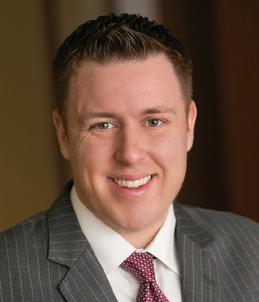
Employer Contributions
Made by company, pooled account
$14,000/ $17,000 (if age 50+) $20,500/$27,000 (if age 50+) N/A
Same as employees
Employer must either contribute 2% of W-2 earn ings, or match first 3% of employee contributions. Immediate vesting.
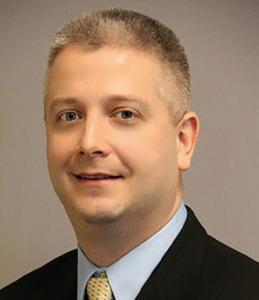
Owner(s) contributions may be limited** N/A
Employer may match or contribute but is not required to. Some employer con tributions can have vesting schedules, others (Safe Harbor) vest immediately**
Employer Contributions (Profit-Sharing)
Participant
to
Pre-Retirement
Administrative
N/A
Optional profit-shar ing contributions can bring total limit to $61,000/ $67,500 (if age 50+)*
Variable by age/ income of em ployees. Can be fixed amounts or % of salary. Total amounts can be much higher than 401(k), plus profit-sharing.
N/A
in question. This greatly improves the plan sponsor’s (firm’s) opportunity to target these plans to a specific contribution and thus reduce tax liability.
As with many financial decisions, conversa tions with your financial advisor will help you narrow down options to the one that is best for you and your firm. While the details can seem overwhelming in the beginning, a good team of financial professionals can simplify the process to allow you to focus on running your practice. ⚖
Additional Considerations:
*Requires a plan document. This should be done through a third-party administrator.
**See Safe Harbor paragraph
***TPA services, fidelity bonds and audits (when employee count exceeds 120) are addi tional costs and increase as assets and employee count grows.
****As a pension-style plan, a CB Plan includes assumed rates of return. If investment returns fall below assumed rates, the employer may be required to make up the difference
Michael Alder (malder@luttner.com) and Matthew Kelly, RICP, (mkelly@lfgco.com) are with Lifetime Financial Growth LLC (www.lifetimefinancialgrowth. com), one of the largest privately owned financial planning and wealth management firms in the Midwest. The firm employs over 270 advisors across six states and manages in excess of $6.5 billion at the time of this article.
If you would like to comment on this article for publication in our next issue, please send an email to editor@pabar.org.
Don’t miss the Member Benefits & Services insert at page 16.

 By George Martin
By George Martin
So, there I was. A single father of two. Fired. Today, that’s a great start to a story about how I started what became one of the first and largest practices of its kind in Pennsylvania. Then, it was a somber reality.
It was 1979, and I had to leave work early one day to pick up my young children — ages 2 and 5 — from daycare. Long story short, my firm fired me. The story that follows and the practice that was built in the process is one of which I am very proud, though it certainly had its bumps along the way. Even now, some 51 years after my first admission, I am flattered when attorneys ask me for advice on managing or growing a practice. Sometimes the queries come from someone new to the law; sometimes they are more experienced or in managing roles. The common thread is that they want to continue to grow and improve, which was always a goal of my own. So, I figured that, having announced my retirement at the end of 2022, I might share some thoughts on that topic with a broader audience.
“Slow and steady wins the race.”
Back when I was in my jobless predicament, a friend of mine worked for a personal injury firm in Philadelphia that had, in addition to its core practice, a bunch of workers’ compensa tion cases. This type of file was notoriously low paying, but my friend saw an opportunity for his buddy. “You know, we’ve got these cases, and we don’t make any money on them,” he said. “Why don’t you handle them? It’ll give you something to do while you figure things out.” So, I took them, and I made a few hundred bucks and sent back a 20% referral fee. They made money, the cases were handled, I put bread on the table, and everybody was happy. So, I set up shop.
At first it was just me, a secretary and a dictation machine. I would dictate and she’d work the phone. Then we’d switch roles. I’d work the phone while she typed. Word got out.
“What are you doing with these cases?” other attorneys would ask the firms sending me work. “Nothing!” they’d say, “We just send them over to Martin and we get a referral fee!”
Suddenly everyone was saying, “Send them to Martin!” The more I handled, the more work came in.
The second dictation machine was a big day for the firm because I could keep dictating while my secretary typed.
Initially, I was in a shared space with five other lawyers, renting my little corner of the office. Maybe a year or so into it, I got my own lease when we moved to the Lewis Tower Building in Philadelphia.
Around 1982, I added another attorney. Not because we had the money to spend, but because we couldn’t handle the vol ume. So it went, every couple of years: Add another attorney, bring in more volume.
There was never an “Aha!” moment of growth. Consistently and steadily, each year would be better than the year before. It just grew. Firms realized they needed to do nothing but send me the case and they’d make money on it. Eventually, of course, we got to the point where the volume and the practice became a profitable mechanism.
My takeaway for you: Can you find an area of the law where there is a need, where people need someone to represent them and where there’s not already a plethora of attorneys doing it? Even an area within another area. The second you become known for doing something that no one else can (or wants to) do, you become a go-to for that work.
“If we desire respect for the law, we must first make the law respectable.”
Louis D. BrandeisThere may be some 50,000 active attorneys licensed to practice in Pennsylvania, but I am very much a subscriber to the Abraham Lincoln model of the small-town attorney.
After all, when you think about it, the law is still, in many ways, a small-town practice: The number of attorneys in each pool is limited and you encounter the same people in your work over and over. Rather than be an obvious adversary, why not treat them the way you want to be treated? It is easy for some to be cutthroat or go back on their word. Perhaps they believe that ferocity gives them an edge, but that has never been my style. We can still get things done when we operate honestly and respectfully. To me, reputation is every thing. When people treat each other with respect, it is a more professional, collegial bar.
My takeaway for you: Be cordial and professional in front of judges. Be civil to attorneys on the opposite side of your case. We can still get things done when we operate on a level of respect.
“There is only one boss. The customer. And he can fire everybody in the company from the chairman on down, simply by spending his money somewhere else.”
Sam WaltonTaking cases that no one else wanted was only part of my story. To build business, then and now, it’s pretty simple: Deliver good service. What does that mean?
It means answer the phone. Return calls. Be honest in all your dealings. Do the best job that you possibly can. Handle every case like it was for a family member.
This is true even in defeat. There were times that I would advise a client to take a settlement, but they wanted to press on. I would say, “Here is the offer, here is what I recommend.” In the end, you must do what the client directs you to do. But if you practice honesty, responsiveness and show genuine care with every client and every attorney who sends you work, you will build strong, true relationships that foster more work, more clients and more referrals.
My takeaway: If something costs $1 in two different stores, but one store treats you bet ter, that is where you will shop. Some things never change, like good customer service.
“Alone we can do so little; together we can do so much.”
Helen KellerFor all attorneys and especially trial lawyers, bar association involvement is vital. It helps you build relationships and improve the health of everyone’s practice. My firm never had to formally adopt a policy that incoming attorneys get involved with a bar association because every partner is engaged on his own and sets that exam ple, from the Pennsylvania Bar Association to the Philadelphia Bar Association, the Philadelphia Trial Lawyers Association, the Pennsylvania Association for Justice, the American Association for Justice, other trial lawyer organizations and sections within each group. I don’t mean attend a network ing event or educational session. I mean get involved. Spearhead an effort. Start a com mittee. Influence legislation. Bar association
work absolutely pays dividends to both you and your firm.
My takeaway: Make the time to work this involvement into your practice. The connec tions you make and the foothold it gives you to position yourself as a leader in the bar have incredible value and pay dividends for years after your involvement.

“Power is the ability to do good things for others.”
Brooke AstorAs attorneys, we have an incredible capabil ity to use our expertise for the betterment of others. Whether it’s a grassroots effort or a major charity, it is a privilege — dare I say a duty? — to contribute to a deserving cause. Think about it: The analytical mind of an attorney works in incredible ways in terms of strategy and risk management. A few hours of your time can change the future of a charity.
I have always been passionate about the environment, so early on I got involved with small environmental organizations in the
county in which I reside, including sitting on local planning commissions. In 1996, I founded the George and Miriam Martin Foundation, named for my parents, which has given more than $14 million to charita ble organizations working to protect rivers and watersheds. I also serve on the board of trustees for Earthjustice, the world’s largest nonprofit environmental law firm. It is usually a David v. Goliath situation in court for us, but it is good, honest work, and I often come away with more than I ever give.
My takeaway: You truly can make the world a better place. Do not underestimate the change you can affect.
“It’s when the well runs dry we appreciate the worth of water. Don’t let your well run dry.”
Benjamin FranklinYou cannot accomplish anything outlined above if you do not first take care of your self. As an environmentalist, I enjoy being outside, so I have pursued some incred ible personal adventures over the years. These outings reenergize me. They give me enthusiasm and, more often than not, a new approach to my work.
I have kayaked in Chile, Costa Rica and Turkey. I have spent close to 100 days in the Grand Canyon on the Colorado River. I took four days to summit Mount Kilimanjaro.
Do you have an interest outside of the law you can build? You need not buy a ticket to Tanzania to accomplish this for yourself. Go to the gym. Take a tennis lesson. Do something just for you and your physical and mental health. You will reap the benefits tenfold.
My takeaway: If you are not careful, you can end up giving your whole life to your practice. Do not let that happen. Give it the best part of yourself, which is the one that is fulfilled and refilled outside of that work.
You may note a common thread through all of the takeaways; be persistent, meticulous and conscientious. Do unto others as you would have them do unto you. Practice good works that benefit others. Take care of yourself.
We who are fortunate enough to practice the law are privileged to be a part of such an intellectually challenging and rewarding profession. I am beyond grateful for my own practice and experiences.
If you have read this far, I thank you. I hope you derive benefit from the takeaways and I wish you nothing but the success and happi ness I have enjoyed. ⚖
George Martin is the founding partner of Martin Law, Philadelphia, one of the largest law firms in Pennsylvania focusing solely on workers’ com pensation, Social Security disability, long-term disability and veterans’ benefits.


If you would like to comment on this article for publication in our next issue, please send an email to editor@pabar.org.

“The leading rule for the lawyer, as for the man of every other calling, is diligence.”
Abraham Lincoln
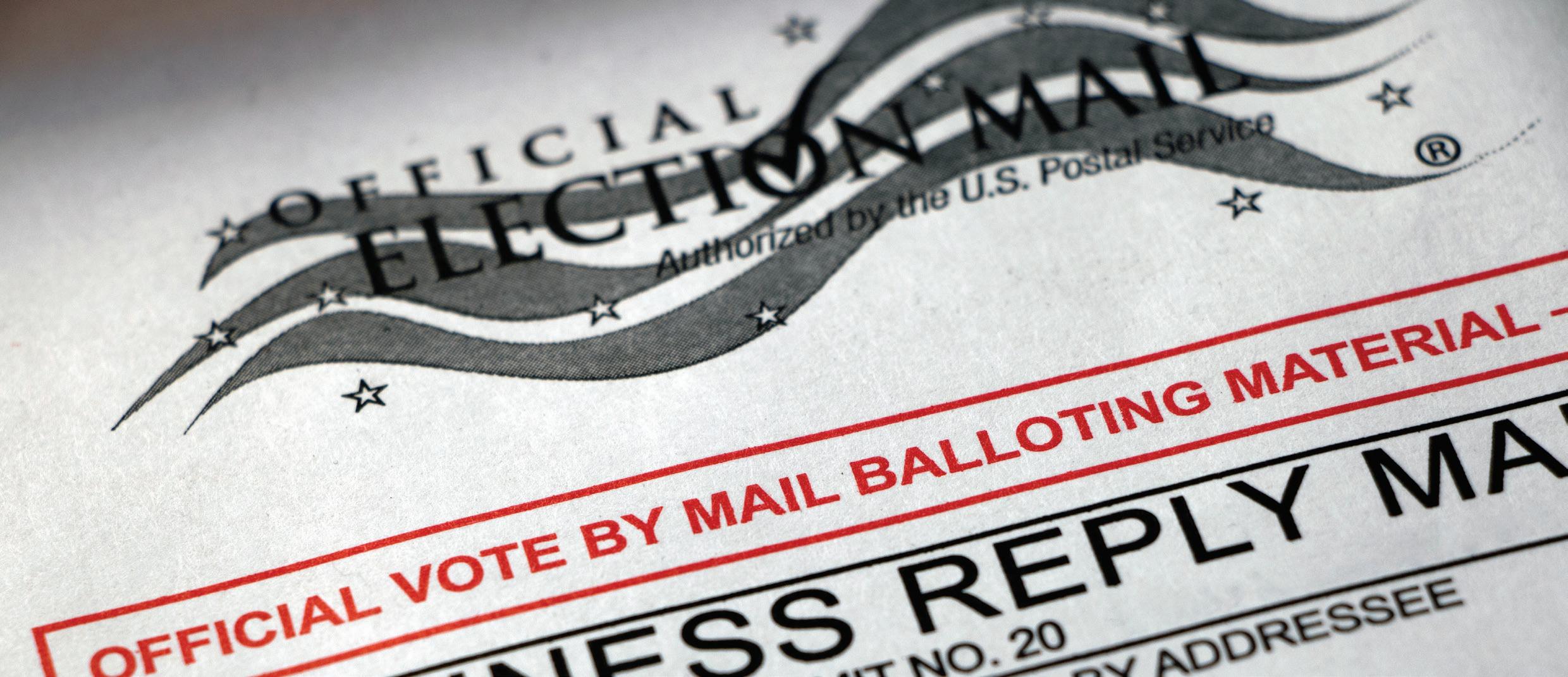 By Stephen B. Edwards
By Stephen B. Edwards
Mail-in voting in Pennsylvania seems endlessly controversial. The commonwealth’s “no-excuse” mail-voting statute, commonly referred to as Act 77, passed in 2019 with broad bipartisan support and little fanfare. Fast-forward three years, and the law has been at the fiery center of some of the most significant election litigation in decades, including high-profile challenges brought in federal and state court by such diverse actors as former President Donald Trump’s 2020 reelection campaign and the Pennsylvania Democratic Party. On the level of legal doctrine, these cases have measured the practical mechanics of mail-in voting — drop boxes, secrecy envelopes and handwritten voter declarations, to name a few — against constitutional standards such as equal protection and the individual right to vote. On a more popular level, these cas es fueled the already-roiling public discourse concerning election integrity, putting many Pennsylvania judges in a national spotlight not unlike the era of Bush v. Gore. All this
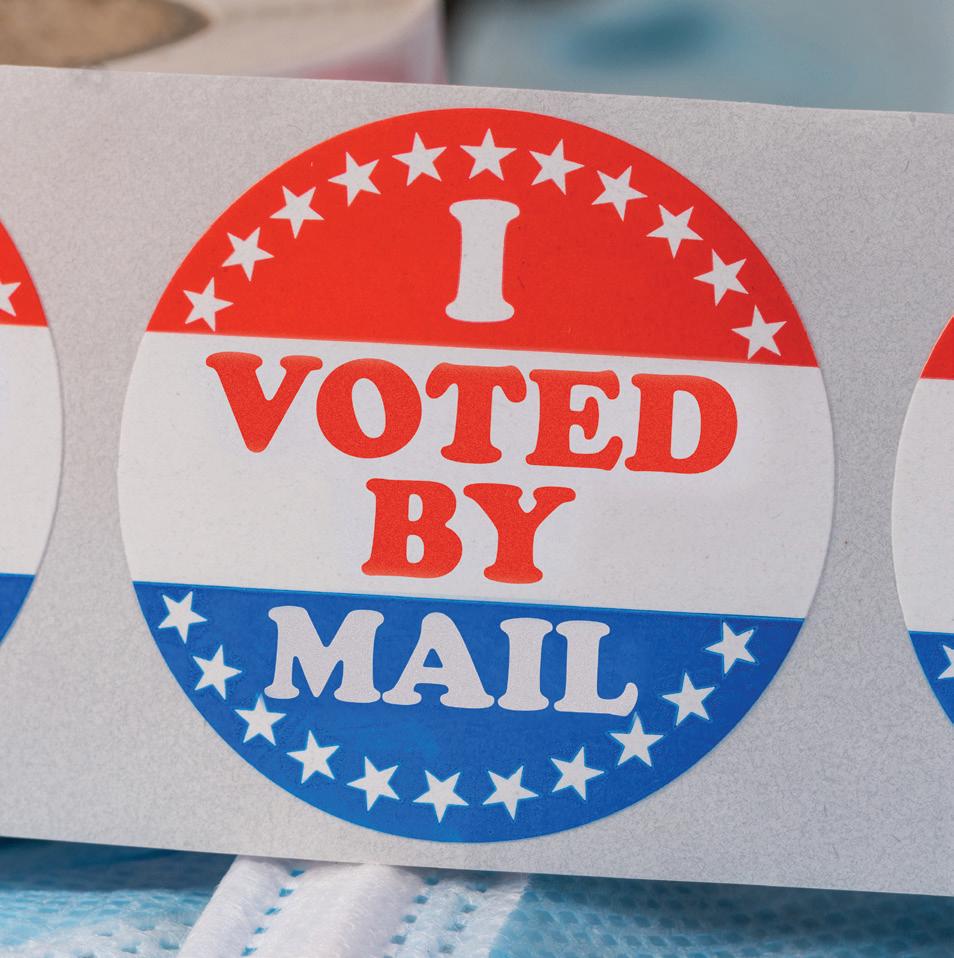
over a law that simply aimed to let you vote from your couch.
A recent decision of the U.S. Court of Appeals for the 3rd Circuit may have opened a new frontier in this type of litigation. In Migliori v. Cohen, the 3rd Circuit decided that an obscure provision of the Civil Rights Act of 1964 — dubbed the “Materiality Provision” by the court — would not allow the Lehigh County Board of Elections to discard a group of mail-in ballots cast in a 2021 judicial election simply because the voters neglected to write the date they signed the voter declaration printed on the outer “secrecy” envelope. The federal court reached this conclusion despite unequiv ocal language in Act 77 requiring voters to write this date, and in direct defiance of an earlier Commonwealth Court case holding that the very same ballots had to be disqualified. In October, the U.S. Supreme Court quietly vacated Migliori, but did so in a manner that avoided a decision on the case’s merits. Thus, Migliori’s true test has yet to come, and if the decision’s reasoning is reinstalled by future cases, its implica tions for continued enforcement of Act 77 and other Pennsylvania election laws could
be enormous. At bottom, the case raises fundamental questions about the role of judges in democratic elections that are guaranteed to resurface. Additionally, while some Pennsylvania observers may bristle at Migliori’s outcome — federal judges telling state election officials how to interpret their own laws — they should not forget the Pennsylvania judiciary’s long-standing prac tice of essentially refusing to enforce certain election rules to preserve individuals’ ability to participate in democracy.
The case that became Migliori was originally filed by David Ritter, a Republican candidate for a judgeship on the Lehigh County Court of Common Pleas. Ritter was one of six candidates vying for three open seats on the court in the November 2021 election. According to the initial vote tally, Ritter came in third place and thus won a seat, but only by a razor-thin margin of 74 votes. Before Ritter could be installed as a judge, however, Zachary Cohen, the Democratic candidate who came in fourth place, filed a challenge with the local Board of Elections disputing the results. Cohen argued the board should have counted 257 mail-in ballots that lacked the required date on the outer envelope but
were compliant in every other respect. After some deliberation and a public hearing, the board agreed with Cohen and announced it would canvass the ballots.
Ritter promptly sued in the Court of Common Pleas, placing himself in the ironic position of asking his would-be judicial colleagues for help getting on the bench. He argued the board had violated Section 1306-D(a) of the Pennsylvania Election Code, which pre scribes the procedure voters must follow to fill out and return a mail-in ballot. In relevant part, Section 1306-D(a) states that each voter “shall . . . fill out, date and sign the declaration printed on” the outer secrecy envelope containing the mail-in ballot.
Textually speaking, Ritter seemed to have a strong case — the ballots in question did not comply with a mandatory requirement of the Election Code and thus had to be set aside.


But the trial court disagreed. Relying on a 2020 case in which the Pennsylvania Supreme Court grappled with the same is sue without forming a majority opinion (more on that later), the court held the require ment of a handwritten date on the outer ballot envelope did not serve significantly important election interests to justify disen franchising voters. Crucially, the trial court also noted its concern that ruling otherwise would run afoul of the Materiality Statute.
Ritter appealed to the Commonwealth Court, which reversed. Over the dissent of Judge Michael H. Wojick, a three-judge panel of that court opined that the dating requirement does indeed serve important election-integrity interests, namely, provid ing a date against which the mail-in voter’s eligibility can be measured (to legally vote, voters must reside in the relevant elec tion district for 30 days prior to election day) and “preventing the tabulation of potentially fraudulent back-dated votes.” More fundamentally, the panel criticized the “no harm, no foul” methodology of the trial court, which seemed to imply courts
have discretion to disregard ballot defects they consider “technical” or “unrelated to important government interests.” Unless doing so would violate the state or federal constitution, the panel held that mandatory language in the Election Code must be fol lowed, even if individual voters are disen franchised as a result.
By this time, it was January 2022 and the results of the Lehigh County election had still not been certified. On Jan. 27, the Pennsylvania Supreme Court declined to hear an appeal of the Commonwealth Court’s ruling, seemingly bringing the con troversy to a close. Four days later, however, a group of voters whose mail-in ballots were among those disqualified sued in federal court, seeking to compel the Board of Elections to count all 257 ballots under the aegis of the Materiality Provision. With apologies to the reader, a full citation to the enigmatic text of this law cannot be avoided:
No person acting under color of law shall … deny the right of any individual to vote in any election because of an error or omission on any record or paper relating to any application, registration, or other act requisite to voting, if such error or omission is not material in determining whether such individual is qualified under State law to vote in such election.
In essence, the federal plaintiffs argued the absence of a date on their ballot envelopes was an “error or omission” on a “record or paper relating to [an] act requisite to voting”
As a member, you should be receiving routine PBA emails, including the PB A e -brief and impor tant updates such as details about the PBA advocac y for lawyers

If you aren’t receiving these emails, check your email account ’s “junk ” folder to see if PBA email is being misdirected there. If so, click on one of those emails and whitelist pabar.org.
If the emails are not in your “junk ” folder, it ’s possible that you unsubscribed from our email list. (Unsubscribing to one email removes you from the list used for many PBA elec tronic communications.) You can get back on the PBA email list by sending your name and email address, with “Resubscribe” in the subjec t line, to communications@pabar.org.

Pennsylvania courts have already set a precedent of selectively enforcing election regulations.
Every lawyer has a favorite “war story” — a tale of a hard-won legal battle, a story with a hilarious twist, an account of an incredible escapade. Pick your best can’t-top-this adventure with a judge, jury, client or col league and write about it for us in 400 words or less.

We’ll choose the best of the best to share with our readers in an upcoming issue of The Pennsylvania Lawyer magazine.

Email your “war story” to us at editor@pabar.org or mail it to
Pennsylvania Bar Association, Attn. Editor, The Pennsylvania Lawyer, P.O. Box 186, Harrisburg, Pa. 17108-0186.
that was not “material” in determining whether they are qualified to vote under state law. The implications of this ostensibly innocuous string of legalese are profound. The Materiality Provision sets up a scheme whereby the federal courts assess whether state election administration laws should be enforced based on their examination of whether those laws are truly “material” to a voter’s qualifications under state law. In other words, it puts federal judges in the business of determining which state election laws are significant enough under state law to warrant enforcement.
This, at least, is the 3rd Circuit’s view of the provision. The district court tossed the voters’ suit, but the appellate court reversed in Migliori. There, the 3rd Circuit forcefully rejected the notion that the absence of a handwritten date on the secrecy envelope could disqualify a mail-in ballot, calling the dating requirement “superfluous and mean ingless.” Relying on the final clause of the Materiality Provision, the court held that only violations of voting regulations that relate to “whether [an] individual is qualified to vote under Pennsylvania law” could justify the disqualification of a ballot. Voter eligibility in Pennsylvania turns on age, citizenship, residency in the relevant election district and felony conviction status. Thus, because
the dating requirement has nothing to do with these criteria, failure to comply with it cannot disqualify a ballot.
The Migliori Court seemed to acknowledge that carrying its reasoning to its logical conclusion would effectively gut many regulations aimed at combatting election fraud. As it dismissed Ritter’s arguments concerning the fraud-prevention goals served by the dating requirement (which, as you will recall, were deemed legitimate by the Commonwealth Court), the panel stated that “fraud deterrence and prevention are at best tangentially related to determining whether someone is qualified to vote.”
Migliori was decided on May 20, 2022, with the judges issuing a written opinion a week later. Almost immediately, political actors mobilized the decision in attempts to shape the results of the May primary. Dave McCormick’s campaign for Pennsylvania’s open U.S. Senate seat filed suit in the Commonwealth Court seeking to compel the election boards of 60 counties to count undated mail-in ballots already in their possession (Election Day was May 17).
The campaign succeeded, resulting in a Commonwealth Court opinion that directly contradicted Ritter’s earlier victory (both de cisions were unpublished), but McCormick conceded the election before that decision
What’s the lawyer story you most love to tell when you bend an elbow with friends after hours?
The case raises fundamental questions about the role of judges in democratic elections.
came down. In the eastern part of the state, the beleaguered Lehigh County Board of Elections and its Northampton County counterpart found themselves the target of a federal suit attempting to extend Migliori’s holding to ballots that lacked a secrecy envelope and that didn’t reach the boards by 8 p.m. on Election Day because of mail delays. This case settled rather anticli mactically with the Lehigh Board agreeing to include new instructional material on proper voting procedure with each mail-in ballot. Nonetheless, the case demonstrates Migliori’s potential to undercut enforcement of any election regulations that don’t directly concern a person’s eligibility to vote.
The outcome in Migliori and the addition al litigation it has spawned will no doubt alarm some readers of this publication. Why should the federal courts decide which Pennsylvania election regulations are en forceable? How can they know the law of the commonwealth better than Pennsylvania’s own judges? These federalism concerns are well taken. But on another level, Pennsylvania may not have the moral high ground when it comes to resisting Migliori’s broad reading of the Materiality Provision.
For a long time now, our Supreme Court has treated enforcement of many provisions of the Election Code as a discretionary affair,
regardless of how clearly the statute dic tates a particular outcome. In a line of cases stretching back decades, when confronted with mandatory language in an election law — like the voter “shall … sign and date” his ballot—the court has essentially engaged in a policy analysis to see if the requirement at issue serves a sufficiently “weighty interest” to be enforced. Employing this method, the court has refused to throw out mail-in and absentee ballots based on various “techni cal” defects, including using the wrong color of ink and writing in the name of a candidate who was already on the ballot.
Indeed, in one of the 2020 election cases involving the Trump re-election campaign, the Pennsylvania Supreme Court reached the same result as the 3rd Circuit with respect to undated mail-in ballots, albeit without relying on the Civil Rights Act and without reaching a majority opinion. There, the court held that Act 77’s dating require ment was merely “directory,” meaning that while the statute undeniably required mail-in voters to write the date they signed their declarations, failure to abide by this rule could not justify disqualifying any ballots. Only Justice David N. Wecht dissented from this reasoning, aptly observing that “a man date without consequence is no mandate at all.”
FEDERAL SERVICES & RESEARCH: Attorney directed projects at all Federal agencies in Washington, DC, including: USDA, TTB, EPA, Customs, FDA, INS, FCC, ICC, SEC, USPTO, and many others.
Freedom of Information Act requests, copyright deposits, document legalization @ State Dept. & Embassies, complete trademark, copyright, patent and TTAB
COMPREHENSIVE: U.S. Federal, State, Common Law and Design searches, INTERNATIONAL SEARCHING EXPERTS: Our professionals average over 25 years experience each FAST: Normal 2-day turnaround with 24-hour and 4-hour service available
GOVERNMENT LIAISON SERVICES, INC. 200 N. Glebe Rd., Suite 321 Arlington, VA 22203 Ph: 703-524-8200, Fax: 703-525-8451 Minutes from USPTO & Washington, DC TOLL FREE:1-800-642-6564 www.GovernmentLiaison.com info@GovernmentLiaison.com

These cases have measured the practical mechanics of mail-in voting … against constitutional standards.
attorneys worldwide”
The point here is that while it may sting a little more when a federal judge does it, the Pennsylvania courts have already set a prec edent of selectively enforcing election regu lations. One could even argue that judicial involvement in elections via the Materiality Provision is less offensive than the course taken by the Pennsylvania Supreme Court, because the former employs a relatively cabined inquiry based solely on whether a given requirement relates to “whether [an] individual is qualified under State law to vote.” This differs starkly from the open-end ed policy analysis under which Pennsylvania courts distinguish “weighty interests” from “technicalities” unworthy of enforcement.
As noted earlier, Migliori was vacated by the Supreme Court in October. The Court issued a perfunctory order dismissing the case as moot under United States v. Munsingwear, a case from 1950 that will probably only be familiar to academics and the highest tier of appellate practitioners. Munsingwear allows the Court to vacate a lower court’s decision when proper merits review was “prevented through happenstance.” Crucially, however, use of this device allows for later relitigation of the issues decided by the vacated deci sion — because the case is moot, the court cannot opine on the merits or create guiding precedent. Migliori was rendered moot when the Lehigh County Board of Elections
certified the results of the underlying judicial election on June 28, after the Supreme Court declined to stay the 3rd Circuit’s ruling.
The Court’s denial of a stay, however, drew a dissent from Justice Samuel Alito, which was joined by Justices Neil Gorsuch and Clarence Thomas. The dissent provides a preview of these justices’ view of the 3rd Circuit’s expansive reading of the Materiality Provision and will almost certainly figure in future litigation over the same issues.
Justice Alito wrote that the 3rd Circuit’s decision “is very likely wrong” because the statute’s text indicates it is meant to apply only to defects in the voter registration process, rather than the act of voting itself. He also added that while the Materiality Provision protects against denial of the “right to vote,” a voter’s own failure to follow reasonable rules for casting a vote — like voting by the appointed time on Election Day and mailing one’s ballot to the correct address — amount to “forfeiture of the right to vote, not the denial of that right.”
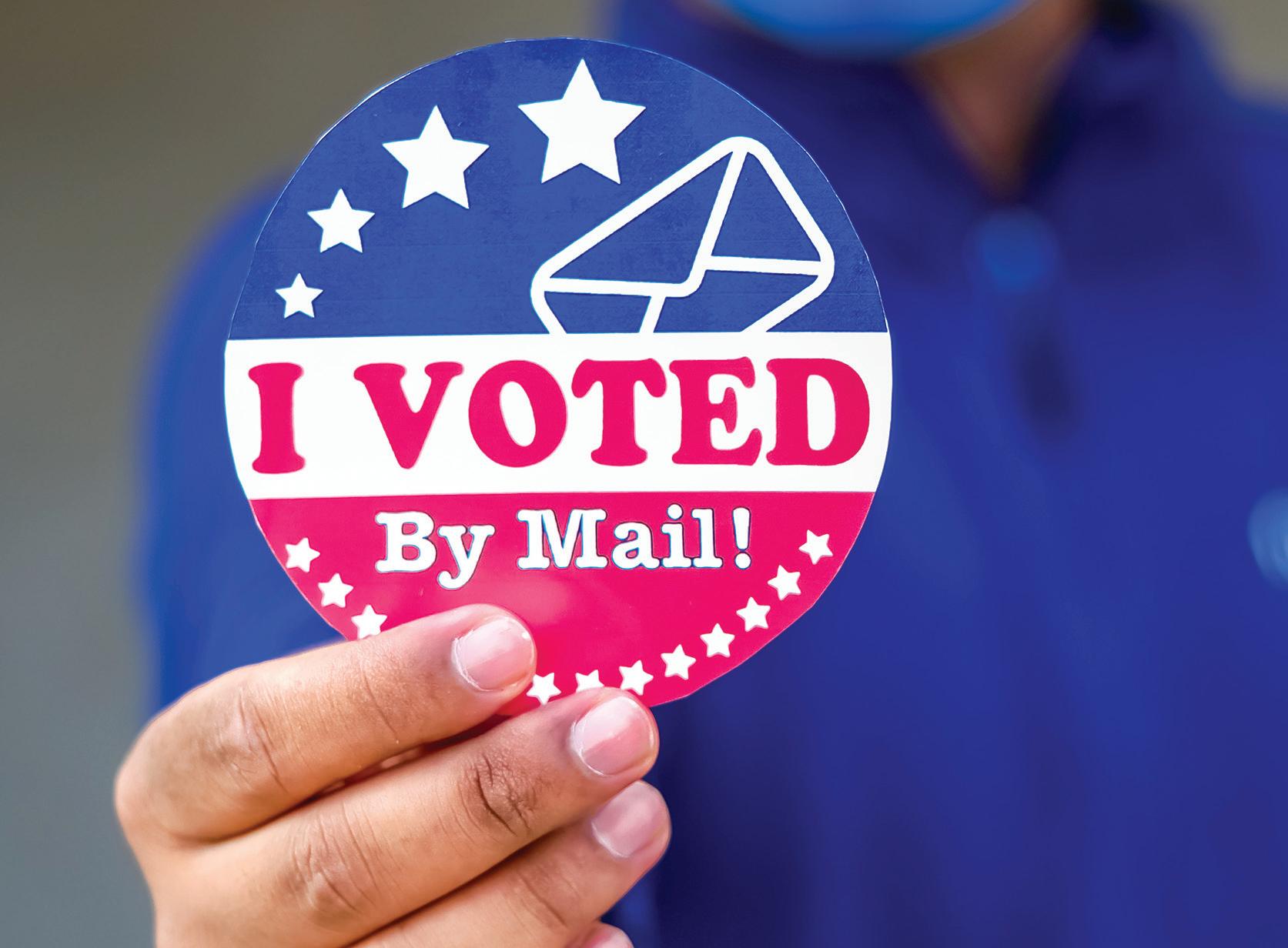
Given Migliori’s anticlimactic end, the fundamental questions it raises about the proper scope of the Materiality Provision — and, more broadly, the role of judges in democratic elections governed by statute — will likely have to be resolved in an appro priate case before the next major election. So, in the event that the fall midterms or the 2024 general election come down to anoth er judicial nail-biter in the mold of Bush v. Gore, don’t say you weren’t warned. ⚖
Stephen B. Edwards is an attorney in Harrisburg with a background in federal civil rights litigation and appellate representation.
If you would like to com ment on this article for publication in our next issue, please email us at editor@pabar.org.
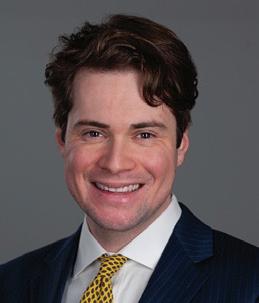
Pennsylvania may not have the moral high ground when it comes to resisting Migliori’s broad reading of the Materiality Provision.
provided by The Honorable Thomas I. Vanaskie
• 24 years on the Federal bench (Third Circuit Court of Appeals and Middle District of Pennsylvania)
• Unmatched credentials and experience makes him uniquely qualified to assist parties resolve disputes with guidance that is informed, impartial, fair and objective
• Available to resolve disputes in business and commercial, class action and mass tort, employment, ERISA, insurance, antitrust, securities, intellectual property, civil rights and personal injury cases
• Serves as a Special Master in complex litigation and is highly experienced in the area of e-discovery and privilege review
Hon. Thomas I. Vanaskie (Ret.)

425 Biden Street, Suite 300, Scranton, PA 18503 • 570.969.5360 • tiv@stevenslee.com www.stevenslee.com

Free search service — exclusively for PBA members. Search members by practice area, geographic location and language.
Members: Log into your PBA Member Dashboard and start connecting today!
 Robert Angelo Creo
Robert Angelo Creo
You never get a second chance to make a first impression.
— WillRogers, actor and social commentator
Earlier columns addressed the lawyer’s reputation, self-aware ness, professional growth, persua sion skills, navigating emotions and the importance of perpetual learning; as well as insight into best prac tices for competency, contentment and professional development. (PBA members can refer to columns published in previous issues using their member login at https:// www.pabar.org/site/News-and-Publications/ Pennsylvania-Lawyer-Magazine.)
Judgment and decision-making theory and practice are best understood when read in the context of the series. Recent columns offered specific best practices that can be integrated easily into the practice of law, regardless of the nature of individual employment. This current series explores decision-making in the context of cognitive biases that affect choices and how attorneys counsel clients. The last column explored the escalation of commitment despite red flags and warning signs suggesting a different course of action. In this issue, we address the Primacy and Halo Effects and Anchoring Bias.
When I was serving as an arbitrator between the National Football League and the National Football League Players Association, there was a case scheduled for Giants Stadium in New Jersey. My tardy morning flight delayed my arrival for almost an hour, so my patience waned when I had to wait another 10 minutes or more before the receptionist took me to the hearing room. After all, I was the arbitrator, boss for the day! All my annoyance dissipated as a tall, blond man approached me with hand extended and with the greeting, “Hello, I am John Mara. Welcome to the home of the New York Giants.” Although I had met several other team owners during my too-brief tenure as one of the four NFL arbitrators, I was struck by Mara’s presence and his interaction with me. As he walked away from his guiding duties, my thoughts were, and continue to this day, of him and the Giants under his leadership being top class.
The Primacy Effect is the tendency to recall and emphasize the first piece of informa tion we encounter more than that acquired later. It may have a significant impact on our decisions and actions. We all have heard that first impressions matter. Opinions can easily be manipulated or skewed based on the first impression of an object or person or the artic ulation or presentation of a position or pitch.
“
”
The Primacy Effect is the ten dency to recall and emphasize the first piece of information we encounter more than that acquired later. It may have a significant impact on our decisions and actions.
Many studies have confirmed the common belief that in elections, ballot position is critical, with the advantage going to those listed on top. One 1998 study concluded that citizens who felt compelled to vote and lacked sufficient information to make informed choices developed biases toward candidates listed earlier on the ballot, and they generated reasons to vote for the candidates and rationalized explanations to vote against those in lower ballot positions.
The Primacy Effect has a close relative, the Halo Effect, which is the tendency for an impression created in one area to influence opinion in another area. Psychologist Daniel Kahneman, in his book Thinking, Fast and Slow, introduced the concept of “exagger ated emotional coherence” to home in on the Halo Effect. He defines it as a tendency to like or dislike everything about a person based on one experience with them or a trait you have not observed but have heard about or been told by someone. He notes that when people are either failing or making a negative impression, they look inept, but if they are succeeding, there is a positive image of strength and competency. This first impression, whether direct or not, sets up your subsequent beliefs about a person’s competency, and new information is unlikely to change your opinion. The
power of celebrity endorsements is based upon the power of the Halo Effect.
Psychologist Solomon Eliot Asch pioneered research into impression formation and suggestion. He conducted experiments in which he asked students to form an initial impression of a hypothetical person based upon an initial list of character traits. Some subjects received a list starting with positive traits and others received a list containing exactly the same traits but in reverse order. The first list characterized the individual as intelligent, industrious, impul sive, stubborn and envious; the second list contained the same items in reverse order.
When they described the hypothetical per son, more favorable impressions occurred with students who read the lists in which the positive traits came first. After reading the first list, study participants described the individual as a capable and meritorious person with some shortcomings. Those provided the second list described a person with problems with limited abilities resulting from their serious difficulties.
Many instances readily come to mind of working with attorneys who were eager to give me the “skinny” on opposing counsel or a judge. These were vague, conclusory statements, such as, “straight-shooter,”
“watch your back,” “ruthless,” “phony” and “aggressive but honorable.” When I asked what brought them to this conclusion, the response was sometimes a specific inter action or example, but more often just “the reputation” of the lawyer, mostly informed by gossip. I assume that the Primacy Effect did influence my thinking about the lawyer or judge until there were sufficient interac tions for me to formulate my own view.
My brilliant flash of the obvious was that reputation, even in larger legal communi ties, is critical for your own effectiveness in representing clients. When the “Rambo” lit igation style became popular in the 1980s, perhaps spawning a generation or two of incivility, I eschewed that approach and focused on becoming a third-party impar tial mediator. I thought it was unfortunate that the petulant and pugnacious aspects of lawyering were elevated, especially to the public through advertising and popular television shows and movies that focused on the combative nature of representation rather than the problem-solving, transac tional nature of the daily work of lawyering. Yes, warriors are effective, and it is appro priate for lawyers to promote themselves as fighters to the public and within the legal community. My experience, though, is that often the billboard image of the lawyer was inconsistent with his or her cooperative and civil manner of negotiating and interacting with opposing counsel in mediation. But the Primary Effect of this “media-perso na” resulted in me keeping my guard up when initially dealing with these lawyers to determine if they believed the ends justified the means and if they would approach mediation in the combative manner con sistent with their promoted reputation. I have concluded that, with few exceptions, advertising is to obtain clients and that the fighter role is one of many valid approaches to the marketplace that may have little to do with reputation within the legal commu nity. Reputation does, however, matter and

impacts initial and subsequent interactions and decisions of others.
People develop estimates heavily influ enced by their starting point. This becomes an anchor. They unconsciously assess value based upon what initial information is provided and then adjust from the anchor to come to a final answer or outcome. The adjustments (negotiating concessions) away from the anchor are usually insuffi cient to mitigate the effects of the initial anchor point. Answers/outcome are biased toward the initial anchor even when the anchor is random, subjective or immate rial and since it is not based on objective criteria.
Studies have shown that when provided with suggested metrics or numbers, people are unconsciously influenced, even with clearly irrelevant or unrealistic information. A common example is to ask people what age Mahatma Gandhi was when he died (79). Those primed with the number 114 answer with a higher number than those

primed with 35. This is an easy experiment anyone can duplicate, with any estimate in volving numbers, such as money, distance, age, weight or population. For another example, if you ask people about the pop ulation of Hong Kong and prime some of them with the number 3 million and others with 10 million, the responses will track the prompts, with higher answers for the latter (2022 estimate: about 7.5 million).
It is critical to understand the combina tion of the Primacy Effect and Anchoring Bias when you formulate demands and negotiate procedural issues or economic settlements. Where you start dictates where you end. The common mistake negotiators make is to put forth initial demands that are extreme, outrageous and easily dismissible by opposing counsel. My view is that when making the first move, it should be a proposal that is aggressive but one that has a rational basis, and, al though unlikely to be obtainable, within the realm of possibility. It need not reflect the fair market value of the case. For a more detailed treatment, see “At the Table: The
First Course — Demands and Offers,” in the September/October 2016 issue.



The Primacy Effect can also affect our decision-making ability due to its influence on the Anchoring Bias. The Anchoring Bias describes an individual’s tendency to rely on initial information to anchor subsequent judgments and interpretations. The Primacy Effect partnered with the Anchoring Bias results in people relying too heavily on the first piece of information they receive and then neglecting any subsequent informa tion. This mix of cognitive biases can be especially problematic, as it prevents an individual from learning and promotes the making of rash decisions.

When people make referrals to lawyers, they inadvertently prime the potential client with positive descriptors and assurances. If the contact comes from media advertis ing, clients are primed by the image and content of the public relations product. Here are common sense tenets and tips to reinforce the Primary and Halo Effects and confirm the underlying cognitive bias in your favor to promote your own identity and reputation:

• Be on time.
• Dress appropriately for the audience.
• Project calmness from the start.
• Ask questions, avoid monologues.
• Ask them what they heard that brings them to you.
• Be authentic — walk the talk.
There is no need to do a hard sell because you are already in their minds and rolling on the down slope. (Also see “Aplomb in the Eye of the Storm” in the November/ December 2020 issue.)

Anchoring bias is real, so you must be vigi lant to minimize its impact and not have it unduly influence your negotiation strategy. One technique I often used as a media tor when confronting the outlier plaintiff demand was to ask if I could double it and bring it to the opposing counsel. My goal was to surprise the plaintiff’s team to gauge the reaction of counsel and to assess what level of stock and credibility they placed into the demand as a realistic anchor point. They usually asked what the thinking was behind my suggestion. This allowed me to approach it from a variety of ways, depend ing on my on-the-spot assessment of the reactions in the room. I often asked them if they were intentionally trying to anchor the negotiations after having read an article on anchoring in a legal publication! If this was the case, we discussed it in a transparent manner and considered whether or not this particular number would be more effective as an anchor than one twice as high or half as much. My contention was that anchors that were extreme or clearly outliers were ineffective and counterproductive. If counsel was not intentionally attempting to anchor the negotiations, then I asked them what was the likelihood expressed as a per centage of them paying this initial demand or one doubling it. The answer was always zero. I might shrug my shoulders and say, well, since there is the same change of zero, why not propose the doubled start ing point? The response was usually that it would make it more difficult to get the defendant to respond at all and settlement negotiations would quickly reach impasse. The lawyers usually understood by then that the demand that they had proposed earlier would have the same negative effect on the negotiation dynamics. A new initial demand would be crafted for me to take over to the defense. Sometimes, I would














Asch, S. E. Forming Impressions of Personality, 41 The Journal of Abnormal and Social Psychology, No. 3, 258 (1946).
Bazerman, Max H., Judgment in Managerial Decision Making, 2nd Ed., (John Wiley & Sons, Inc., 1990).
Kahneman, Daniel, Thinking Fast and Slow (Farrar, Strauss & Girous, 2013).
Koppell, J.G.S. and Steen, J.A., The Effects of Ballot Position on Election Outcomes, 66 The Journal of Politics, No. 1, 267 (2004).
Li, Victor, Legal Sleaze, ABA Journal, 33 (August 2022).

Miller, J.M. and Krosnick, J.A., The Impact of Candidate Name Order on Election Outcomes, 62 Public Opinion Quarterly, No. 3, 291 (1998).


Slovic, P. and Lichtentein, S, Comparison of Bayesian and Regression Approaches in the Study of Information Processing in Judgment, 6 Organizational Behavior and Human Performance, 649 (1971).
ask for permission to present the demand and explain how it was revised based upon my input to a lower starting point. This was a win-win for the plaintiff and for me as mediator — the plaintiff appeared more reasonable and ready to advance to an acceptable position and I enhanced my mediator capital with both sides.
Rarely do we stop, dissect and ponder the impact of initial information to understand and adjust for the impact of primacy halos and anchoring.
I do not know if John Mara understood the Primacy Effect or if it was just natural to him to extend a personal greeting and welcome me into his “house.” The case was lopsided in the team’s favor; the Giants won the arbitration case. The outcome was decided in my mind by the time the hearing was concluded. In retrospect, I know my positive first impression of the owner and the organization did not influence me nor tip the scales of justice. ⚖
Pittsburgh attorney Robert Angelo Creo practiced as an in-house corporate lawyer and a solo and small firm general practi tioner before becoming a full-time neutral. He has mediated and arbitrated thousands of cases, including as a salary arbi trator for MLB, a grievance arbitrator for the NFL and a hearing officer for the U.S. Senate Select Committee on Ethics. He is the editor-in-chief of Elkouri & Elkouri How Arbitration Works 2022 update. He has been on the mediator roster of the Court of Arbitration for Sports, Lausanne, Switzerland, which provides ADR services for international sports, including the Olympics. He served as adjunct professor at Duquesne
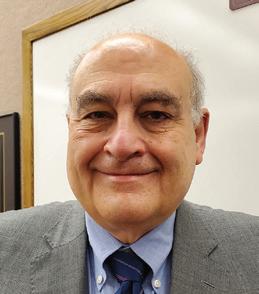
University School of Law and at the University of Pittsburgh School of Law. He is a recipient of the PBA ADR Committee Sir Francis Bacon Alternative Dispute Resolution Award. He is annually named as a Superlawyer and included in Best Lawyers in America, where he was recognized as a mediator of the year and for arbitration, Pittsburgh. He has a passion for storytelling, is the principal of Steel City Storytellers LLC (www.steelcitystorytellers. com), has coproduced a 2022 Emmy-nominated television pilot and is working on a television spe cial of storytellers. He researches and presents on lawyer contentment and is the principal of Happy! Effective Lawyer LLC (happyeffectivelawyer.org). His website is www.robertcreo.com. If you have a story to share on this subject or other practice topics, please email racreo@gmail.com.
• The order information is received affects thinking.
• Lawyers are not immune from the Primacy Effect.

• Reputation matters and proceeds you to form impressions.
• Cultivate and act consistently with your values and goals.
• Different starting points yield different outcomes.
• Adjustments away from anchors are usually insufficient to negate anchoring bias.


Your PBA Office Depot® Member Benefits Program has been rebranded to ODP Business Solutions
TM
Work has changed and this exciting evolution allows for the program to be more agile and innovative. Whether you’re looking for ink and toner, paper, cleaning products, office or school supplies, count on ODP Business Solutions to be in your corner to help you succeed.

Shop online and receive savings of up to 75% on the Best Value List of preferred products with free next-business-day delivery* or pickup your online order via in-store and curbside pickup.**
To register and access your savings, visit: bit.ly/pabaod
*Free Delivery: Minimum purchase required after discounts and before taxes. Orders outside our local delivery area and most furniture, oversized, bulk items, cases of bottled water and other beverages and special-order items do not qualify. Non-qualifying orders incur a delivery charge (minimum charge of $9.99). Many orders can be delivered next business day (between 8:30 AM and 5:00 PM) if placed online or via phone by 3:00 PM or via fax by 1:00 PM, local time (In most locations). Other restrictions apply. **Curbside pickup is available in most stores, subject to state and local regulations. Orders must be placed 1 hour before store closing. See odpbusiness.com, call 888.2.OFFICE or ask your Account Manager for details.
and
Responsibility Committee and Philadelphia Bar Association Professional Guidance Committee Joint Formal Opinion 2022-300
Ethical Considerations in the Handling of Flat, Earned Upon Receipt and Nonrefundable Fees

In 1995, the PBA Committee on Legal Ethics and Professional Responsibility issued Formal Opinion 1995-100, “Ethical Considerations in Connection with Retainers Paid on Account of Legal Services.” In the opinion, the committee concluded, inter alia, that (1) “nonrefund able retainers are permissible but any arrangement for a nonrefundable retainer must be confirmed by the clear and unam biguous language of a written statement
provided to the client or a written agree ment between the attorney and client,” and (2) “in the absence of a clear written statement or agreement to the contrary, retainer payments must be deposited into a client escrow account.”
In response to inquiries relating to Opinion 1995-100, the PBA Committee on Legal Ethics and Professional Responsibility and the Philadelphia Bar Association Professional Guidance Committee issue this joint opinion to clarify whether, and under what conditions, nonrefundable fees may be deposited into the attorney’s operating account. The committees con clude that, if the fee is not only simply a “flat fee” but a fee deemed “earned upon receipt,” attorneys may deposit these fees into an operating account rather than a Rule 1.15 IOLTA account or other trust ac count. Any fee not “earned upon receipt” is deemed an “advance” fee which may only be deposited into the operating account if the client provides informed consent, confirmed in writing in accordance with Rule 1.15(i).
The issues in this opinion implicate Pennsylvania Rules of Professional Conduct 1.0, 1.4, 1.5 and 1.15.
Rule 1.0 (Confirmed in Writing) states in relevant part: (b) “Confirmed in writing,” when used in reference to the informed consent of a person, denotes an informed consent that is given in writing by the person or a writing that a lawyer promptly transmits to the person confirming an oral informed consent. See paragraph (e) for the definition of “informed consent.” If it is not feasible to obtain or transmit the writing at the time the person gives informed con sent, then the lawyer must obtain or trans mit it within a reasonable time thereafter.
Rule 1.0 (Informed Consent) states in rele vant part: (e) “Informed consent” denotes the consent by a person to a proposed course of conduct after the lawyer has communicated adequate information and explanation about the material risks of and reasonably available alternatives to the proposed course of conduct.
Rule 1.4 (Communication) states in relevant part: (b) A lawyer shall explain a matter to the extent reasonably necessary to permit the client to make informed deci sions regarding the representation.
Rule 1.5 (Fees) states in relevant part: (a) A lawyer shall not enter into an agreement for, charge, or collect an illegal or clearly excessive fee. The factors to be considered in determining the propriety of a fee include the following:
(1) whether the fee is fixed or contin gent;
(2) the time and labor required, the novelty and difficulty of the questions involved, and the skill requisite to perform the legal service properly;
(3) the likelihood, if apparent to the client, that the acceptance of the particular employment will preclude other employ ment by the lawyer;
(4) the fee customarily charged in the locality for similar legal services;
(5) the amount involved and the re sults obtained;
(6) the time limitations imposed by the client or by the circumstances;
(7) the nature and length of the profes sional relationship with the client; and
(8) the experience, reputation, and ability of the lawyer or lawyers performing the services.
(b) When the lawyer has not regularly rep resented the client, the basis or rate of the fee shall be communicated to the client, in writing, before or within a reasonable time after commencing the representation.
Comment [2] to Rule 1.5 provides in perti nent part: “A lawyer may require advance payment of a fee, but is obliged to return any unearned portion. …”
Rule 1.15 (Safekeeping Property) states in relevant part:
(b) A lawyer shall hold property of clients or third persons that is in a lawyer’s pos session in connection with a representation separate from the lawyer’s own property.
(i) A lawyer shall deposit into a Trust Account legal fees and expenses that have been paid in advance, to be withdrawn by the lawyer only as fees are earned or expenses incurred, unless the client gives informed consent, confirmed in writing, to the handling of fees and expenses in a different manner. (emphasis supplied).
Pa.R.P.C. 1.15(a)(10) defines “Rule 1.15 Funds” as “funds which the lawyer receives from a client or third person in connection with a client-lawyer relationship, or as an escrow agent, settlement agent or repre sentative payee, or as a Fiduciary, or re ceives as an agent, having been designated as such by a client or having been so select ed as a result of a client-lawyer relationship or the lawyer’s status as such.” When the term “property” appears with “Rule 1.15 Funds,” it means property of a client or third person that the lawyer receives in any of the foregoing capacities.
Pa.R.P.C. 1.15(a)(11) defines a “trust account” as an “account in an eligible institution in which a lawyer holds Rule 1.15 Funds.” A trust account must be main tained either as an IOLTA account or as a non-IOLTA account. The committees consid er advance fees/retainers to be Rule 1.15 funds that must be deposited into an IOLTA or other trust account. Conversely, flat fees paid in advance, and earned on receipt, are not Rule 1.15 funds, and Rule 1.15 would not apply to those funds because they are not “to be withdrawn by the lawyer only as

• Amended Rule 1.2, providing guidance for representing clients in the medical marijuana industry
• Amended Rule 1.17, allowing lawyers and law firms to buy/sell a single area of practice, and the possible impact on succession planning
• Updates on the Rules, ABA recommendations, ghostwriting, protecting confidentiality in electronic communications and the cloud, and the requirement of familiarity with technology to maintain competence
Protect yourself and your clients by owning the Pennsylvania Ethics Handbook. Edited by Michael L. Temin and Thomas G. Wilkinson, Jr., with invaluable input from Victoria L. White and members of the PBA Committee on Legal Ethics and Professional Responsibility, this book features ethics opinions, case law, articles, and practical guidance for addressing everyday questions and problems. The cost is $99.
FOR MORE INFO AND TO PURCHASE: www.pbi.org ALSO AVAILABLE AS AN e BOOK
fees are earned or expenses incurred” as set forth in Rule 1.15(i).
Rule 1.5(b) requires that “[w]hen the lawyer has not regularly represented the client, the basis or rate of the fees shall be communicated to the client, in writing, before or within a reasonable time after commencing the representation.” This rule does not require a formal engagement letter or fee agreement, just some “writing” that memorializes the agreement between the lawyer and the client on payment. The best practice, consistent with promoting the communications required by Rule 1.4(b) is for a lawyer to prepare a formal
letter that the client co-signs or otherwise formally acknowledges at the inception of the attorney-client relationship specifying the nature of the engagement and how a one-time nonrefundable fee will be handled by the lawyer.
Rule 1.5 contains no requirement that the fee agreement stipulate whether the fee is to be maintained in an IOLTA or other trust account or may be deposited into an operating account, but this rule must be read in conjunction with Rule 1.15. When there is a “flat fee” arrangement, the lawyer should specifically state whether the fee is intended to be nonrefundable and earned upon receipt. See, ODC v. Ostrowski, 135
DB 2008 (2009) (holding that because dis closure of fee as a “flat fee” was insufficient to transform the retainer automatically into lawyer’s personal property, the fee should not have been deposited into the attorney’s operating account; the disclosure failed to specify that the funds were nonrefundable and earned upon receipt).


Although Rule 1.15(i) requires that the lawyer deposit fees “paid in advance” in an IOLTA account, a fee agreement that describes a fee as “nonrefundable” and “earned upon receipt” should not be considered a fee “paid in advance” and the lawyer is not required to deposit the fee into an IOLTA or other trust account. As a best practice, to assure that there is no misunderstanding, the lawyer also should specifically state in the fee agreement that the lawyer is not depositing the fees into an IOLTA or other trust account. Although a client’s written confirmation is not required, it would reduce the likelihood of confusion by having the client do so.
Confirming the agreement to deposit these fees into an operating account explicitly documents the expectations of both the attorney and the client and would allow the lawyer to deposit the flat fee into the lawyer’s operating account. See Pa. Bar Ass’n Comm. on Legal Ethics and Prof’l Responsibility Formal Opinion 1995-100 (Aug. 1, 1995) (stating that refundable re tainers may be deposited into an attorney’s operating account if a writing provided to the client so states in unambiguous terms).

One example of a disclosure that would meet these requirements is: “Lawyer and client agree that the fee in this matter (1) is a flat, nonrefundable fee which is earned upon receipt and covers the following work (insert scope of the engagement), (2) will not be deposited into an attorney IOLTA or other trust account to be billed against, and (3) will be deposited in the lawyer’s operating account.” We caution that the
phrase “earned upon receipt” is still subject to the limitations of Rule of Professional Conduct 1.5 and does not, by itself, justify retention of a fee where commensurate legal services have not been rendered.

The committees note that, when the engagement has concluded, the lawyer must still determine whether to refund any portion of the fee. “One of the justifications for allowing lawyers to charge a flat fee has been that both the lawyer and the client assume risk. The lawyer assumes the risk that the work may become unduly time intensive; the client assumes the risk that the lawyer will expend less time on the matter than if the lawyer charged an hourly rate.” State of Maine, Board of Overseers of the Bar, Ethics Op. 211 (2014). “As with all fee agreements, however, a nonrefundable retainer may not be ‘illegal or clearly exces sive.’” Pa. Bar Ass’n Comm. on Legal Ethics and Prof’l Responsibility Formal Opinion 1995-100 (Aug. 1, 1995).
Most of the opinions on this issue from other jurisdictions address the inherent risks where the client terminates the engagement before its completion. The concern expressed in these opinions is that a dissatisfied client will not wish to forfeit monies paid as part of the nonre fundable (and possibly excessive) fee in order to discharge the attorney and secure substitute counsel. See, e.g., D.C. Ethics Op. 355 (2010). That is not the situation addressed in this opinion, which assumes that the matter was handled through to its completion. Nevertheless, the attorney must evaluate whether the fee is excessive under the circumstances. When making that evaluation, the lawyer should consider the factors listed in Rule 1.5(a). Any excess must be returned promptly to the client.


As outlined above, the committees conclude:
• Any fee not “earned upon receipt” is deemed an “advance” fee, which may only be deposited into the operating account if the client provides informed consent, con firmed in writing, in accordance with Rule 1.15(i); and,
• When a fee is deemed to be “earned upon receipt,” attorneys may deposit the fee into an operating account rather than a Rule 1.15 IOLTA account or other trust account, provided that the attorney specif ically states in the fee agreement that the fee is intended to be nonrefundable and earned upon receipt. ⚖
Editor’s Note: Joint Formal Opinion 2022300 appears here slightly revised and edited for space. The opinion as issued is available on the PBA website, www. pabar.org.
This material has been compiled by Victoria White, PBA ethics counsel, and edited by Thomas G. Wilkinson Jr., a past president of the PBA and a past chair of the PBA Legal Ethics and Professional Responsibility Committee. The opinions of the committee are advisory only and are not binding on the Disciplinary Board of the Supreme Court of Pennsylvania or on any court. The opinions carry such weight as an appropriate reviewing authority may choose to give them. References to rule numbers are to the Pennsylvania Rules of Professional Conduct. The formal and informal opinions of the committee are posted on the PBA website, www.pabar.org. Questions and requests for copies of opinions should be directed to the Legal Ethics Hotline, 800-932-0311, ext. 2214. Requests may also be addressed to victoria.white@pabar.org.
t. PBA members save 10% on Ruby’s live virtual receptionist and online chat services!

Ruby’s live virtual receptionist and chat services deliver next-level client experiences—helping you capture new clientswhile reclaiming your time for billable work. Plus, we are proud to offer PBA members an 10% discount. Learn more at www.ruby.com/pba or better yet, give us a call at 855-340-7829 and use the promo code PBA!

Her knowledge and experience will make her a great asset to the PBA.
Anna currently resides in Mechanicsburg, Cumberland County, with her husband, two teenage daughters and their springer spaniel. She spends most of her free time camping, hiking and planning their next road trip.
In the last “On the Hill” column, former PBA Legislative Counsel Ashley P. Murphy provided a summary of the June budget and indicated she would be leaving the PBA in early August.

We are excited to welcome Anna Malcein King to the PBA as our new legislative counsel. Anna will be attending many PBA events, so please make sure to come and meet her or invite her to visit your local bar association to talk about the PBA’s legislative work.
Born and raised on a small farm in Columbia County, Anna grew up with a love for adven ture and the open road that’s taken her to all of the lower 48 states. Having settled in Pennsylvania, she’d now like to visit all 67 counties of the commonwealth.
Anna attended Ithaca College and Bloomsburg University, and received her law degree from the Penn State Dickinson School of Law. Prior to joining PBA’s legislative staff, she worked for the Governor’s Office of General Counsel and, most recently, the Pennsylvania House of Representatives. During her 11 years in the House, she served as legislative counsel to three committees and as executive director of one, and she worked on legislation on issues ranging from tax sales to collaborative divorce.
Turning to that legislative work, as I write this column, the PBA Legislative Department is in a race against time! One of the PBA’s big initiatives for this legislative session, which is rapidly drawing to a close, is House Bill 2057, a 262-page bill drafted by the Title 15 sub committee of the PBA Business Law Section. The bill makes major reforms and updates to the Business Corporation Law. You can imag ine the level of effort that went into writing such an important and expansive bill.
Earlier, the Legislative Department was able to overcome some serious obstacles in the House of Representatives, and the bill passed the House unanimously in June. The bill now sits in the Senate Finance Committee. A maximum of nine voting session days remain for the Senate this year. Nine! Getting the bill passed in that extremely small window will not be easy, but we are pushing the pedal to the metal!
In my next column, I will give you a rundown on how the PBA did during the entire 2021-22 legislative session, the results of the election and what we are looking forward to in the 2023-24 session. ⚖
Fredrick Cabell Jr. is PBA director of legislative affairs. For additional information on the PBA’s legislative program, contact the PBA Legislative Relations Department at 800-932-0311, ext. 2232, or email fredrick.cabell@pabar.org.
Fredrick Cabell Jr.
“
”
A maximum of nine voting session days remain for the Senate this year. Getting the bill passed in that extremely small window will not be easy.


The Lawyer Referral Service (LRS), exclusively for PBA members, makes connecting with potential clients easier.

Looking for the opportunity to grow your practice? Join the PBA Lawyer Referral Service (LRS). The LRS receives more than 10,000 inquiries each year from individuals seeking legal help. Referrals are made exclusively to participating PBA members.
And making connections with potential clients is now easier than ever thanks to the online LRS platform, available 24/7/365.
Find more details and sign up here: www.pabar.org/site/For-Lawyers/LawyerReferral-Service
The PBA posts all Lawyer magazine and Pennsylvania Bar News classified ads and Lawyer magazine display ads on the website, www.pabar. org. As a bonus to advertisers, all email and web addresses posted in the online classi fied ads and display ad index appear as live links — so those potential customers and cli ents are just a click away from contacting you!
For more information, contact the PBA Communications Department at 800-9320311, ext. 2226.
REAL ESTATE LAW EXPERT — William F. Hoffmeyer, Esq. — AV rated Attorney/Educator/ Author — Expert analysis and testimony on matters involving Real Estate Law and issues pertaining to attorney and title insurance agent liability. Owner of York’s oldest title searching and title insurance agency. Licensed Title Insurance Agent for almost 50 years and author of the Abstractor’s Bible. For full CV, go to www.hoffsemm.com. 30 N. George Street, York, Pa. 17401. 717-846-8846 Email: info@hoffsemm.com
TITLE SEARCHES, LIEN SEARCHES AND TITLE INSURANCE FOR CENTRAL PENNSYLVANIA — York Abstracting Company, LLC (Y.A.C.O.) 717846-8846, William F. Hoffmeyer, President
THE ABSTRACTOR’S BIBLE, 4th Edition (2015) — A Complete System for Searching a Real Estate Title and Analyzing Court House Real Estate Records. Includes a searchable CD-ROM . By William F. Hoffmeyer, Esq. — Cherry Lane Publishing. publishing@cherrylanepublishing.com 717-846-8846
• PBA member — $35*
• Non-PBA member — $40* (*first 30 words; each additional word $1.50)
Size of PBA Non-PBA of Ad Member Member
1 col. x 1” $ 65 $ 80
1 col. x 2” $115 $145
1 col. x 3” $165 $205
2 col. x 2” $215 $270
• PBA member — $25*
• Non-PBA member — $40* (*first 30 words; each additional word $1.50)
Box Number (Blind) Ads
Processing surcharge $10 (no fee for job seekers)
Legal Marketplace
Pennsylvania Bar Association
100 South Street, P.O. Box 186 Harrisburg, Pa. 17108-0186Call the PBA Communications Department, 800-932-0311, ext. 2226.
REAL ESTATE LAW EXPERT — Richard W. Stewart; Former Chair, Disciplinary Board of The Supreme Court; Former Vice Chair, Pennsylvania Board of Law Examiners; Over 15,000 titles examined; AV rated. Licensed Title Agent and Real Estate Broker, 301 Market Street, Lemoyne, Pa. 17043. 717-761-4540, ext. 288. RWS@JDSW.COM
BOB DAVIS JR. — LICENSE DEFENSE AND ETHICS GUIDANCE — Access to 49 years of experience is as near as your phone, email or FaceTime. Contact Robert Davis Jr. — New practice. Contacts: Cell/FaceTime: 717-580-8941 Email: bobsethics45@gmail.com

F&M Trust 717-441-2096 christian.merritt@f-mtrust.com 15
Government Liaison Services 800-642-6564 GLS@Trademarkinfo.com 47
LawPay 866-376-0950 www.lawpay.com Cover 2
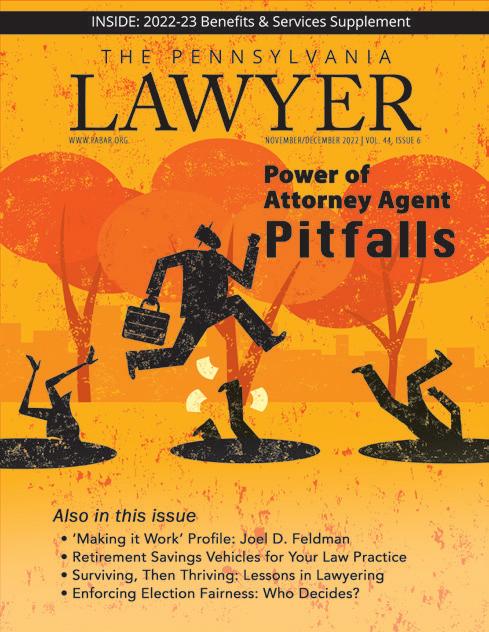
Plummer Slade 412-261-5600 www.plummerslade.com 45
James C. Schwartzman 215-751-2863 jcsc@stevenslee.com 5
USI Affinity 800-265-2876 www.usiaffinity.com 9
Hon. Thomas I. Vanaskie (Ret.) 570-969-5360 tiv@stevenslee.com 49
Good evening, ladies. Good evening, gentlemen. Good evening, others. If you would all please take your seats and postpone boasting about your most recent verdicts until dessert, we can begin.
First, let me welcome all of you here to Sioux City and to Edifice Lex, the Lawyer’s Hall of Fame, where we are proud to present this year’s new admittees. As in years past, the selection has been made by a three-quarters majority vote of the Committee on Self-Aggrandizement, with additional input from the Ad Hoc Committee on Rehabilitative Career Descriptions.
All of our new admittees are colleagues who, by virtue of their exemplary service to the profession and the public have distinguished themselves in various ways. All are lawyers of substance, even if we cannot always agree on exactly what that substance is.

So, without further ado then, let me present this year’s selections. I ask that you please hold on to both your applause and the com ponent parts of your salad until the end of the program.
CHARLES E. CHEAZE III – Chuck was the first divorce lawyer in the nation to unwav eringly insist that his chosen specialty be alternatively termed “family law.” With a newly found aura of respectability, he was finally able to gain admission to both a prestigious country club and a local house of worship, and the use of his preferred nomenclature spread among his colleagues faster than COVID-19. In addition, his
example has led the American Association of Bankruptcy Lawyers to follow suit by also seeking a more attractive appellation. Their first attempt, however, the Coterie of Broke Peoples Counsel, has thus far failed to gain any meaningful traction.
COOPER DEVILLE – Since he first began to practice law, Coop has been a stalwart in the title insurance industry. In the last several years, he has implemented the use of innovative, extra cost title endorsements such as Endorsement 666, Loss by the Wrath of Satan; Endorsement 703, Alien Mortgage Foreclosure; and Endorsement No. XVII, Taking by Sovereign Rights of the British Crown. The contributions he has made to the profitability of the title insur ance industry should not be discounted because he is currently awaiting sentencing for inappropriately billing clients annually for the premiums. He insists it was naught but a pesky computer error and, although he, too, cannot be with us tonight, you can view a remarkable likeness of his face down at the post office.
LULU GERHIG – Known far and wide among members of the insurance defense bar as the “I Won’t Iron Lady,” Lulu once consecu tively tried 2,130 personal injury claims to verdict. That she lost all of them does not in any way diminish her accomplishment. She has already been honored with a lifetime achievement award by the Conference of Hurt Folks Lawyers, and we are thrilled to also recognize her this evening for her con tributions to the personal injury bar.
CARMINE O. DeWALLAWALLA — A wrongful death specialist, Carmine set an as yet unequalled record by successfully handling 119 consecutive cases in which his client
was dead. Alas, his career and life came to a tragic conclusion when, while out jogging one evening, he ran head-first into the rear of a hearse he had been pursuing. The rear door sprung open, the casket shot out the back and he was crushed to death. “Done in by the weight of the evidence,” he was heard to murmur at the last.
And that concludes our ceremony for this year. I hope you have enjoyed it and that you harbor no ill will because once again you were not selected. It’s time to relax and enjoy the sherbet now being served for dessert. It’s sour grape, I do believe. ⚖
“To Wit” is satirical fiction and should not be re garded as necessarily reflecting the official views of the PBA. If, for any inexplicable reason, anyone wants to contact the author, he can be reached at ssponte@gmail.com. © 2022 S. Sponte, Esq.

“
”
It’s time to relax and enjoy the sherbet now being served for des sert. It’s sour grape, I do believe.
